#much less something productive if you want to combine two completely different cultures in the span of what? a month and a half?
Text
late thoughts about my favorite pink princess. warning, it is gently critical analysis of euphemia, since she’s one of my favorites, but also painfully lacking in screen time + development .


honestly, while i want to say euphie / euphy garners softening feelings by nature, c.c. i think would not coddle her like cornelia if in some really odd universe her plans coincided with her half-brother. which...we all know how that went. the princess is an angel but her flaw is in a sense...exactly that. her naivety / impulsiveness , and while this would be more okay if she wasn’t in a position of power? she is in a position of power. so c.c. naturally would be very blunt with her which really..could go either way.
because life isn’t so ‘simple’ and frankly her going back to her good days with lelouch and nunnally is already ‘not possible’ due to lelouch’s choices since deciding their contract , the barbarism of the royal family manipulating / abandoning two orphaned children, and the power struggle for emperor / empress among its heirs. sadly, i don’t want to say euphy / euphie isn’t meant to be in this show...but in a sense she isn’t, because her outlook / state of being can’t survive, and while she’s capable of growth we were robbed of? i feel honestly more like i’m watching a child than i am a teenage girl . more under the cut. again, gently critical. there isn’t a character in this franchise that isn’t someone i have critical thoughts about because i love this compiliation / franchise and when you love something you analyze it like crazy.
she’s designated to be this way, and i wish so much more was done with her, since it seems like another ‘fridge the girl’ story but . . . her story is also a harsh example of someone who really needed to acquaintance herself far more ( and she tried! ) with what she set out to do because beginning the work of SAZ isn’t something you do in a few months, much less announce at a school. she should have continued her studies, she should have lived more years, she should have witnessed things more clearly - because i am far from hating euphemia in any capacity, she’s someone i adore, but i’ve watched her do the same impulsive actions over and over and realize that a lot of things she brings on herself, and this isn’t pitting c.c. vs euphy . i’m saying c.c. would be completely open to pointing this entire point out to her without fear.
there is nothing wrong with being innocent, pure, naive and but the writers ultimately paint euphy into a tragedy that cannot be undone instead of showing what i wish was more a rise and build of people all around her giving her solid criticism instead of coddling (cornelia) , omitting (darlton) , manipulation (schneizel). i won’t say anything about suzaku because i do believe while he genuinely loved her, and she truly loved him, that’s a realm that really hits the tragedy home because i think one of the best written things about her is her trying to understand japan through suzaku / their expeditions but not necessarily enough to make her a suitable viceroy, much less a sub-viceroy if we all actually followed the britannian system in the show.
instead euphy remains a solid, tragic ‘what if ‘ and ‘could have been’, never fully allowed to grow , see error, or be free of endless coddling and omitting of truths. combining all of this, her own shortcomings, the stage upon which everything is set, and lelouch’s entire ambition itself, and you ultimately lead to a very tragic, very nasty, almost inevitable end. basically she deserved better, yes, but also being the way she is did not help her and shows if its too far on one spectrum it can be potentially harmful and a set up for inevitable tragedy / destruction.
#. * ◇ ─ : to give form to a forgotten color. ╱ ❪ c’s world. ❫#i love euphemia so much but her potential is wasted and rushed#and she serves more as a cruel moniker of lelouch's actions having horrific consequences than she stands as her own person.#we don't really have /enough/ of her individuality that isn't hindered by some other cast member for good or bad.#we only really know she loved suzaku; she was naive to her detriment; she was placed improperly into power and then fridged.#ironically the person she adores her own sister is sadly a major factor in euphie's stunted growth into a wiser person .#naivety and kindness and purity is not wrong and should never be considered so.#but remaining that way and having it be to the furthest extremes ultimately becomes more of a flaw than a charm#much less something productive if you want to combine two completely different cultures in the span of what? a month and a half?#again i feel her arc was rushed but there is also a very chilling purpose to it.#euphy simply wasn't ready and unfortunately she persisted in things she wasn't ready /for/ and then the unthinkable happens.#and instead now she only serves as a catalyst of the fridge'd woman who was loved by a major protagonist in the show#besides lelouch himself or the heroine; c.c.#to drag him further into the darkness already long persisting inside him.#it's really messed up why am i talking about it.#oh because i'm on it.#if she had more episodes we could have seen more prominent and solidifying growth but again i feel like the 'mayfly bug' which dies#within hours in nature...euphy sadly is no different.#sadly her good traits are her very flaws.
4 notes
·
View notes
Text
BEST OF 2021 - BL Edition!
Hella subjective utterly erratic awards of little import and no impact. But I love them, okay? Only includes shows that completed their runs in 2021.
BEST KISS 2021

THE WINNER: TharnType 2
There were some killer kisses in BL this year, but basically no one on earth (let alone in BL) can beat out MewGulf in this category. I’m a big fan of the soft sweet candy kiss in the final TT2 episode, but really any of them were great and there were A LOT. (Episode by episode trash-watching recap here.)
BEST DEBUT KISS 2021

THE WINNER: We Best Love
For first timers, this category goes to SamYu of We Best Love, who did a magical job at first kisses in a short run series. (The shorter the run, the less chance the actors have to establish intimacy and become comfortable with each other. Although, Taiwan is generally better at enabling actor intimacy than any other country, possibly because it’s a queer-friendly culture with good workshopping techniques.)
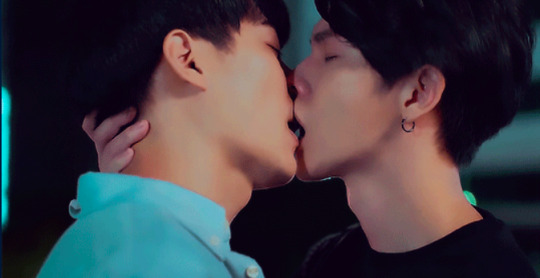
Anyway, tears running down their faces, post baby’s agro shouty confession, on a bridge (another trope) who doesn’t love this kiss? Plus they breathed into each other (how to act a kiss 101 that so many BLs don’t do.
I have to say, the contentious drunken sobbing kiss Sam gave us in season two almost took this whole category, if it weren’t for the struggle beneath all those tears and passion and consent... But really, THAT KISS (and you all know which one I’m on about) wasn’t so much romantic as it was pained and desperate, and it didn’t take this category because that kiss wasn’t about love, it was about loss and failure and regret.
It was, possibly, one of the best kisses in all BL, but it’s not the right kind of kiss to win a romance trope category.
I hope that makes sense.
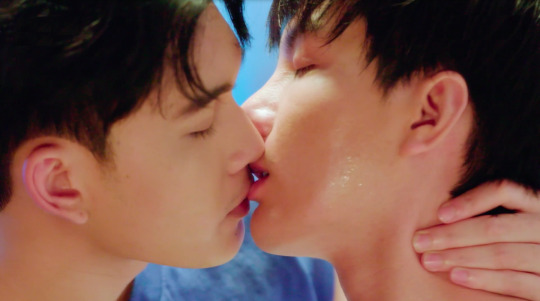
I’m gonna throw a little love Thai BL pulps way, they gave us a number of charming kisses this year, but I was most taken with Second Chance’s PaperFah.
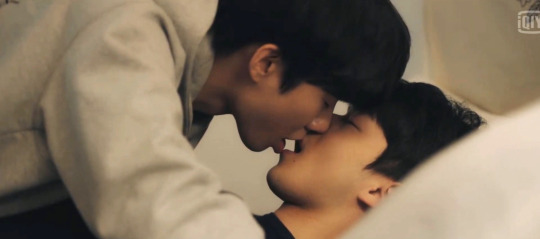
To My Star’s very final kiss was also in contention (Korea, who knew?), but We Best Love beat that one out because I’m a sucker for tears and SamYu... just GAH.
BEST DOCUMENTARY 2021

THE WINNER: Absolute BL AKA Zettai BL ni Naru Sekai vs Zettai BL ni Naritakunai Otoko AKA A Man Who Defies The World of BL
Honestly tho, it was also the only entrant in this category (unless you count Call it What You Want and Lovely Writer). Look, this was a work of genius. A meta commentary that can only really be thought of as Japan taking itself to task for its own tropes, pulling them out, examining and gently mocking them, but still bucking under the weight of expectation and history. I hooted with laughter. It’s insightful, charming, and AMAZING. (Full review here.)
BEST THEME SONG 2021
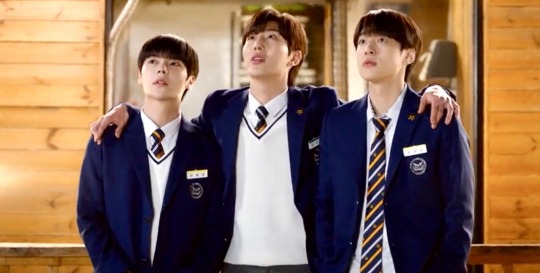
THE WINNER: Light on Me
A.C.E’s song Spark for Light On Me wins OTS. I have to say I also really liked both of Color Rush’s 2 entrants and Wish You’s cute little song, but as a K-pop enthusiast I was really happy to see an actual K-pop song sung by a legit group in a Korean BL. It legitimized all K-BL in a weird way, ya know?
BEST CASTING, DIRECTING & SCRIPT 2021
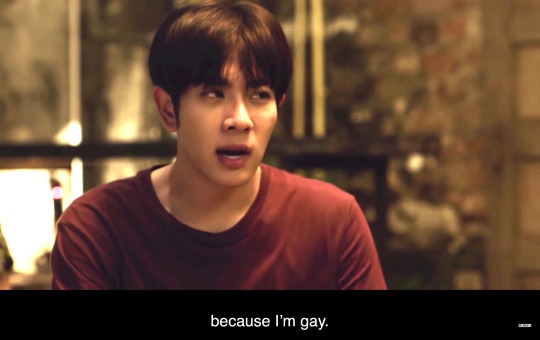
THE WINNER: A Tale of Thousand Stars
The story and execution were great, but the cast really elevated this show into something special. Everyone seemed to perfectly suit their roles and GMMTV made the most out of its stable. Combined with excellent production (and post production) values, 1000 Stars is without question GMMTV’s most mature, charming, and smart BL series. I think it should go down as one of the top BLs of all time. You should feel safe recommending this one to friends and non BL watchers.
BEST USE OF BL TROPES 2021

THE WINNER: Light On Me
Light On Me who drops multiple BL tropes with its two different seme’s for expert love triangle reasons but also uses them for pristine pacing, plot, and character development. Korea is the most strategic user of tropes and I love that they deploy them explicitly to serve narrative a not just to tick boxes. Light on Me is a master class in this technique. (If you write fanfic or romance you should study this show.)
Their best versions included (but were not limited to:
Minister the Artful Injury (for the love triangle)
Meet Me in the Library (for the love triangle)
Crash Into Me (for the love triangle)
That’s MY BOYFRIEND - Public Claiming (to show character’s seme traits and attractiveness of identity ownership and honesty)
Put Your Head On My Shoulder (to show seme character’s pining traits and softness)
Boys on Phones (to advance plot and tension)
Symbolic Gift Exchange (as a twist to show interest and call-back coupledom)
and Touch My Face (that subverted version of the ADORABLE squeeze thing they did to each other)
2021′S MOST UNEXPECTEDLY SOFT SERIES
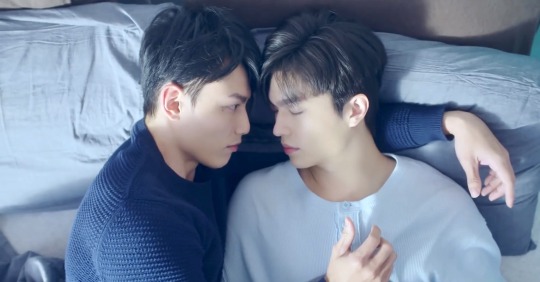
THE WINNER: Be Loved In House: I Do
By far Be Love In House: I Do’s best quality was that the tsundere uke’s tsundere-ness was entirely sympathetic, he was utterly likable from the start. This BL cleverly leaned on great acting and beautiful trope execution to carry a rather weak story, but the two leads being impossibly soft with each other in the home absolutely slayed. Grumpy/tsundere is HARD to execute well, so I was impressed, especially from Taiwan who, let’s be fair, doesn’t really specialize in soft or clever BL. BLINID was both.
Honorable mention to Golden Blood.
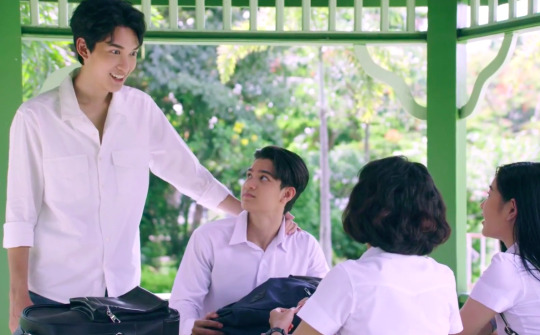
Only Thailand would DARE be this soft with a bodyguard romance. I didn’t expect SunSky and their side dishes (PitchBank) to be so tender and sweet with each other.
BEST MICROFILM 2021
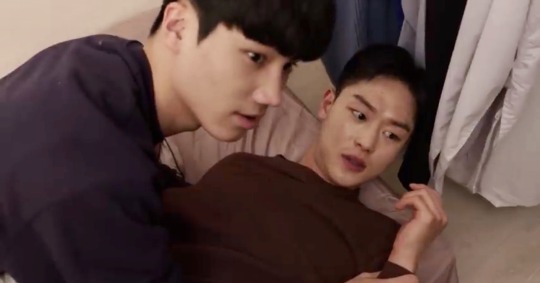
THE WINNER: A First Love Story
Look I adore Hey Rival: I LOVE YOU! but it was still very Vietnamese and so rather flawed in execution. Korea’s Strongberry, on the other hand, have been perfecting the BL microfilm genre (and, let’s be fair, kind of OWN it) since 2017. They are true masters of their craft and yet A First Love Story is still one of the best things they have ever produced. It’s two episodes of about 8 minutes each that manage to perfectly portray the sweetest friends-to-lovers confession ever. It’s joyful, and gentle with its characters, and a little hot.
How on earth do they manage to leave us yearning for more yet completely satisfied at the same time? It’s like the perfect amuse-bouche, that one finger food at that one cocktail party that you will never forget. You are a ridiculous human if you haven’t spent 16 minutes with these two boys. Go watch it now. Or go watch it again. It’s time VERY well spent.
BEST UNIVERSITY SET BL 2021

THE WINNER: Nitiman
This Thai BL pulp had sympathetic characters, a solid tsundere uke redemption arc, and a fantastic pining seme who yearned without bullying, grooming, or gaslighting. Plus when they were together, they were ridiculously soft. But it also had a realistic portrayal of university life, bisexual awakening, and friendship groups. Bummer about the ending. (Full review here.)
BEST HIGH SCHOOL SET BL OF2021
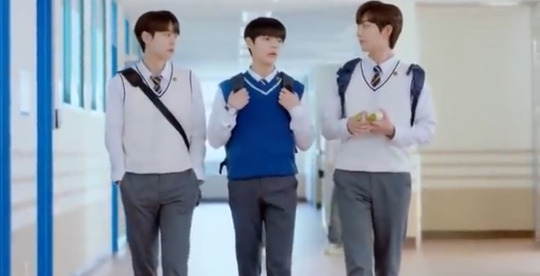
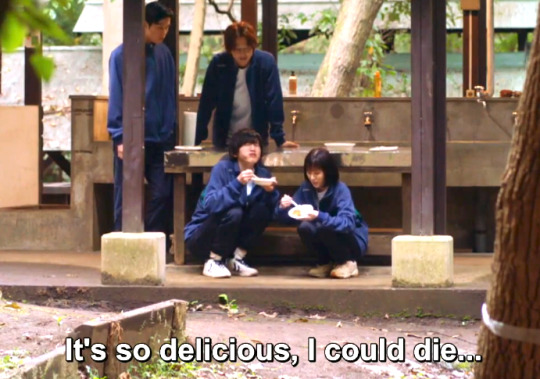
It’s a tie!
THE WINNERS: Light on Me & Kieta Hatsukoi
Korean BL Light On Me managed to portray the angst of high school, social media, and coming out in a refined almost elegant way with all credit given to the uke character for honestly and brutal communication. It had a great friendship group, good teacher character, and even managed to treat Plot Device Girl with integrity. Also the white blue color pallet throughout was very pleasing and classy.
Japanese BL Kieta Hatsukoi AKA My Love Mix-Up! snuck in under the wire to tie Korea’s gem at the VERY end of the year. It was also all teen angst and dramatic crisis over haircuts and text messaging but it was so Japanese slapstick extreme about it. It was a one-show meme-generator and Aoki’s face was a picture of comedic mobility. It was charming origin yaoi in a way that represented for the manga roots of the genre where as LoM was basically showing us how far we have come. Also Kieta Hatsukoi was so Japan’s style where LoM was so much Korea’s, it’s fun to watch two countries separated by the same genre. These two shows exist in equal, if opposite, flip sides of the same coin. How could I decide between the two? The award goes to both.
BEST QUEER REP 2021
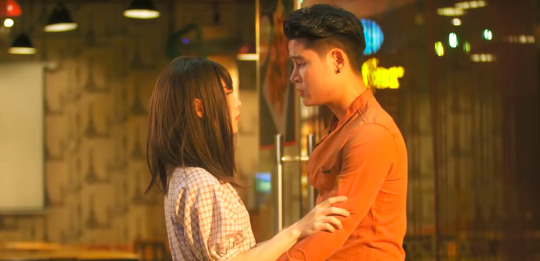
THE WINNER: My Lascivious Boss
While it did have pacing issues and some questionable content at the beginning, MLB’s unabashed queerness carried it though and ultimately elevated it with camp. It never felt like mockery or punching down, it felt joyful, and very new wave BL. It’s as if Vietnam is starting a process of handing out HEAs to all the letters of LGBTQ+ in BL style - I love this look for them. (On YouTube - full review here.)
BEST WARDROBE 2021

THE WINNER: We Best Love: Fighting Mr. 2nd
Mostly I’m classifying WBL as one series aired in two parts, but for this category the second half really takes the gold. THOSE 3 PIECE SUITS on Shu Yi. How Liu Bing Wei always coordinates his tie to Shi Zhe Yu’s suit. It was an absolute pleasure to watch. I never winced once.
BEST HISTORICAL 2021
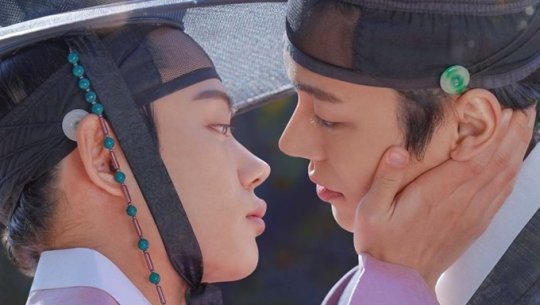
THE WINNER: Nobleman Ryu’s Wedding
A historical setting allowed this BL to use some seriously old fashioned romance tropes (arranged marriage and evil step-sisters) but also modern BL stylings like fake relationship and secret identity (drag) plus some cute gay panic. It was a lot more gentle than any historical BL to date, which is Korea stamping the sub-genre with its mark and standing up to China’s darker traditions. It reminded me of 12th Night more than anything else which just happens to be my favorite Shakespeare play. For all these reasons, I adored it. (Full review here.)
Most Honest to BL’s Roots

THE WINNER: Utsukushii Kare
Given, Utsukushii Kare, and Kieta Hatsukoi all could have released in 2015 as live action yaoi and absolutely no one would have been surprised. They were seriously old school in a PTSD flashback kind of way (if reading yaoi and watching the first live action versions gave you PTSD, which it certainly could have if you were young enough.)
But Given and Kieta Hatsukoi leaned slightly softer, and therefore felt a touch more modern, because Japanese BL is so rarely soft. On the other hand, Utsukushii Kare was harsh as all get up, angry with us and itself, reminding us about whipping boy, and attack dog, and spoiled prince.
This is what an entirely unreasonable tsundere really looks like.
This is what a weird obsessed stalker seme really looks like.
This depicted the collateral that any relationship involving these archetypes causes to everyone around them.
It was exactly as weird and as messed up as any 2000′s yaoi: emo af and hella warped, entirely true to itself with no attempt made to modify its POV for modern sensibilities or current BL fandom. It didn’t pander to us in anyway, and I fucking loved it for that. This is not just live action yaoi in its purest form, it’s Japanese cinema, uncompromising.
LIFETIME ACHIEVEMENT AWARD
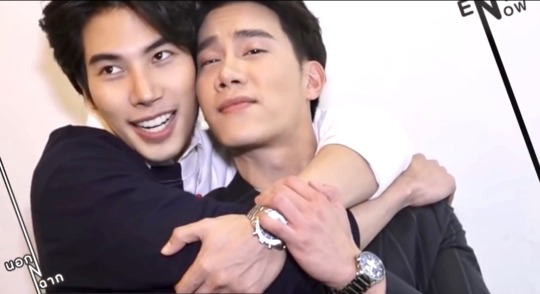
MaxTul
Starting with Bad Romance in 2016, MaxTul are one of the longest running, funny & game, and apparently healthy actor pairs in Thai BL. Never once did they sail their ship astray, miss a port (or a pun), or fail to raise the rainbow flag to honor the queer community (for queens and country).
We are deeply grateful for their service to fandom.
We of the BL navy salute you.
(I’ll stop now.)
BEST BL THAT WASN’T A BL 2021
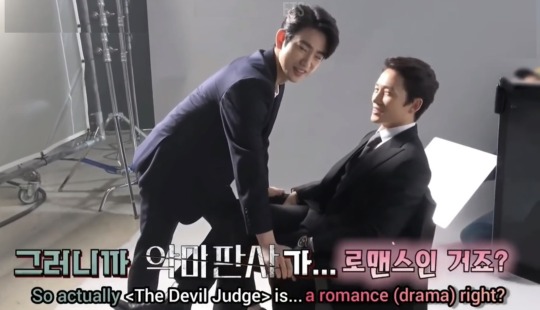
THE WiNNER: The Devil Judge
For a show that was meant to be a dystopian court thriller, these two gents got awfully domestic. Is Korea taking its tips from China’s bromance tradition now?
Anygay, these two were husbands by about episode 3.
Everyone agrees.
Even them.
MOST CHARMING BL 2021

THE WiNNER: To My Star
This little series was quirky as all goddamn getup, but so cinnamon roll adorable out the other side I forgive it all my initial confusion. The grumpy chef and neurotic actor (human puppy) pairing really worked for me. Both actors were great, the kitchen and cafe settings were lovely, and the ending was a peach. Utterly charming.
MOST REWATCHABLE BL 2021
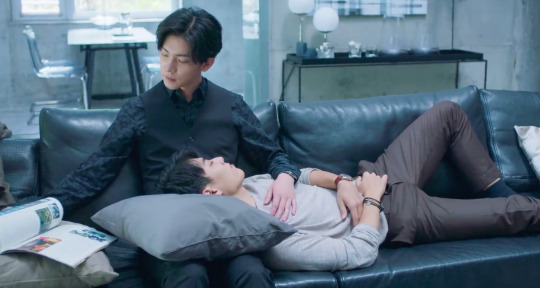
THE WINNER: We Best Love
We Best Love is amazing, just the chemistry alone holds up to multiple rewatches, and THAT drunk scene in part 2! There’s some pretty epic pining in BL, but Gao Shi De pines for Olympic gold, and I happen to love watching a seme suffer. Again and again.
The story is weak but the performances are so good they entirely sweep away a flawed plot, thin narrative arc, and time jump character development. It’s rare for me to like a show DESPITE the story, We Best Love stands with To My Star as one of the few. All told this series is GREAT, I am probably rewatching right now. I want a Viki movie version yesterday. (Full review here.)
BEST BL 2021
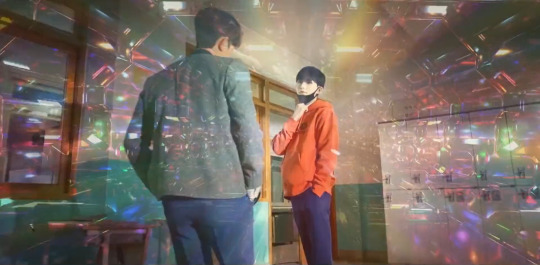
THE WINNER: Color Rush
In a surprise upset Korea stole the gold from top contenders Taiwan (my beloved) and Thailand (the power house). Under STRONG competition from We Best Love, To My Star, Lovely Writer, and 1000 Stars, Color Rush took the top spot.
What can I say? I absolutely LOVE this BL.
What really won it for Color Rush was the brilliant allegory and the ultra clean concept, not to mention Korea’s pitch perfect production values and a heavy dose of classic yaoi filming technique.
Color Rush managed to be both ground-breaking, nostalgic, and charming all at once. I could write a thesis on it. I kinda did.
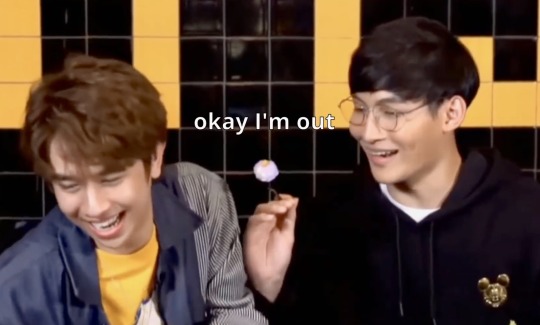
Winners based on my definition of BL.
(source)
#asian bl#best bl#best 2021 bl#thai bl#tharntype kiss#tharntype 2: 7 years of love#mewgulf#taiwanese bl#taiwan bl#taiwan drama#We Best Love: No.1 For You#We Best Love: Fighting Mr.2nd#we best love#samyu#PaperFah#Second Chance#To My Star#Korean BL#K-BL#K-drama#Korean Drama#Absolute BL#A Man Who Defies The World of BL#Japanese BL#Japanese Drama#light on me#color rush#The Devil Judge#Utsukushii Kare#maxtul
496 notes
·
View notes
Note
so I’ve wondered this since the trailer came out years and years ago and Chloe defended the movie - was the red shoes teaser written by the same team that made the movie? were they forced to market it like that, was that based on an earlier draft, etc?? not sure if you know but you seem like the leading expert!
Sorry, this is gonna be an absolute novel because you know I’m an animation fan and the history and production of Red Shoes and the Seven Dwarfs is SO interesting and insane. Like, Tangled levels of insane. Thanks for calling me an expert, no one else was gonna do it so I just kind of took up the helm lol.
Here’s the low-down... The timeline of the movie’s production is an absolute mess and kind of an extremely wild ride. It was in production for ten years, went through a lot of different crew members, and went through at least two other major versions of the story before landing on the final version.
Since there’s not a ton of info on the movie’s production, a lot of this is pieced together from different interviews and context clues, and also a lot of what I’ve read and what I am quoting has been translated from Korean, sometimes pretty roughly. But yeah.
Here’s the story of why the Red Shoes and the Seven Dwarfs teasers and poster were so, so bad and fatshame-y and the actual movie was so, so good and body-positive. (With pictures and production artwork!)
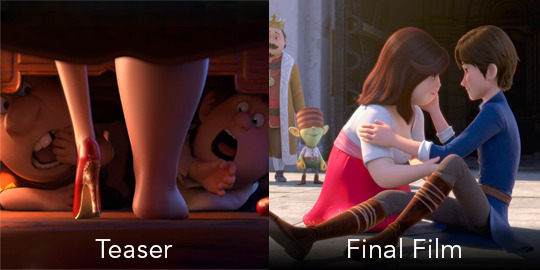
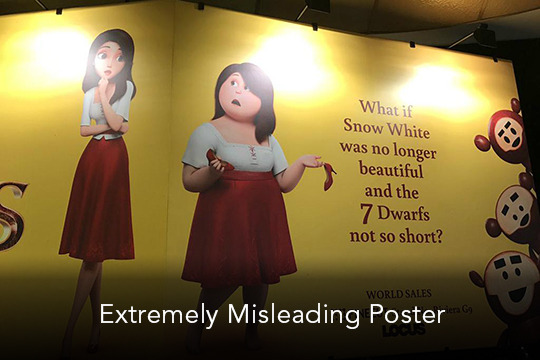
(This is a beast of a post so I’m putting it under a cut.)
All right, so. After its conception originally as a short story by the South Korean studio Locus Creative in 2009-2010-ish, Red Shoes and the Seven Dwarfs was being worked on and was set to come out in Summer 2017, as evidenced by this poster at the 2015 Cannes Film Festival, featuring a different logo and very different character designs for most of the dwarfs.
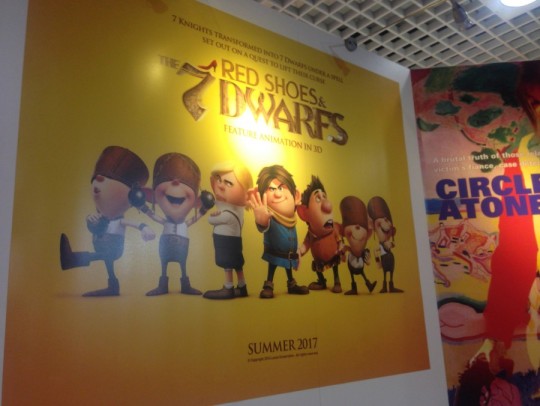
In early-mid 2016, the first teaser (in which we see Snow White undress and then two dwarfs recoil in horror at her fatness when she takes her magic shoes off) was released, after the film had kind of been slowly chugging along for 6 or so years. (I am having such trouble pinpointing when the second teaser was released (in which one of the dwarfs basically attacks Snow while she is sleeping to steal her shoes), but I believe it was around the same time.) The teasers didn’t get that much traction because this was a small film from a small indie studio in South Korea.
None of the final actors had been cast yet. At this point in the production, the story was different, one of the many versions that the movie went through. As in the final movie, the dwarfs were actually cursed knights/princes and Snow White switched back and forth between two body types due to her magic shoes, but in this version, the dwarfs needed to steal the shoes from her in order to break their curse (rather than needing “a kiss from the most beautiful woman in the world” like in the final movie).
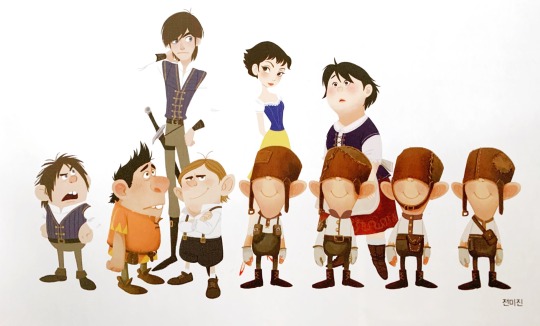
The weird thing is, I believe they had JUST changed the movie’s story when the teaser came out. I’m almost positive it was released more as a proof of concept than as an actual trailer for the movie. They had just recently combined two separate characters (seen above), a typical pretty, skinny princess character (Snow White) and a cute chubby girl character (’Bonnie’), into one single character that switches back and forth between the two appearances when she wears the magic shoes (also they had just dropped literally half of the movie taking place in the real world, with a magic mirror portal, it was a whole thing).
They didn’t have the details of this aspect of the new story hammered out yet, and the first pass at presenting Snow’s magically changing body type, was, yeah, not good and super offensive. This was a really inexperienced indie studio making their first film on a low budget, so even the animation and voice acting wasn’t great. I think they just wanted to get SOMETHING out there because it had been 6 years and they wanted to have something to show for it.
But here’s the thing. Despite how the teasers make it seem, this was always supposed to be a movie about body positivity, letting go of appearance-based prejudices, and loving yourself and others for who you are and for who they are, which we see in the final film.
I like to think of our film as a kindhearted one. Our intentions are nice.
- Director Sung-ho Hong
It’s important to keep in mind that this movie was made in South Korea by a 99% Korean crew, and, as I understand it anyway, in Korean culture, ‘fatshaming’ is not really a thing that is seen as overtly offensive. Also, children’s media there seems to have more adult things in it than in the US, which probably accounts for the more risque parts of the teasers. That said, I really believe that at this point in the timeline, the movie was on-track to be bad (or at least not very good) when it was released, and it would have ended up bad IF a few key players hadn’t signed on (which I’ll get to in a moment).
Interestingly, the movie’s producer, Sujin Hwang, said in a 2017 interview:
“[Both teasers] were solely produced to induce curiosity. They’re completely irrelevant to the actual story.”
- Producer Sujin Hwang
I think what she was trying to convey was that neither one is a scene in the actual movie, because while the teasers didn’t reflect the revamped story as it existed in summer 2017 (the time of the interview), they DID reflect the earlier version of the story where the dwarfs wanted her shoes, which is what the story was at the time they were made.
Now that we’re in post-teaser 2016, HERE’S where things start to turn around. After the teasers were released, my guy Disney veteran and native Korean Jin Kim joined the project. He and Red Shoes director Sung-ho Hong had been buddies for about eight years and Sung-ho had been trying to get Jin to come to Seoul and work with him at Locus for a long time, and he finally succeeded.
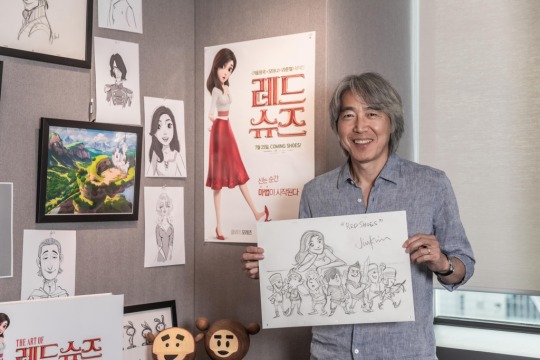
Jin and his twenty years of Disney experience as an animator and senior designer on films like Tangled, Frozen, Big Hero 6, Zootopia, and Moana, had a HUGE HUGE HUGE influence on the movie. He redesigned almost all the characters, oversaw all the visual development from the moment he signed on, and heavily (HEAVILY) supervised the animation, literally going frame-by-frame through preliminary animations and drawing over them, teaching the inexperienced animators at Locus everything he knew. (Literally almost everyone except him either only had TV experience or had no professional experience because they just gotten out of school.)
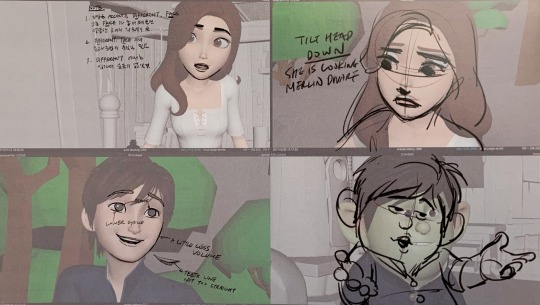
From an outsider’s perspective, it really seems as though Jin joining the project (and his gargantuan effort) made the quality SKYROCKET. Not just in character design and animation, but also in things like effects animation, story, etc. After he joined, Locus really started pushing HARD to make a good, high-quality movie, and his influence and experience from being a prominent figure at Disney was absolutely key. The studio also began to really study Disney films and other well-made animated films from other studios to really try and pinpoint what the DNA of a good animated movie really is.
I don’t have any solid evidence, but I’m pretty sure that Tony Bancroft (an animator and the co-director of Mulan) then joined the project because he’s good friends with Jin Kim. He is only credited as the voice director (the movie was recorded in English and the characters were animated to the English dialogue), but I am SURE that he probably also had a pretty big influence on the movie, because like... How could he not? I really really think there was more to his role than his title would have you believe, even though there’s almost no info out there about it.
So now the movie goes through a gigantic metamorphosis. Character designs, visual development, and animation quality are all rapidly improving, the story is tightening, and the themes of the movie (which, again, were always the same and intended to be positive) are being presented in a more sincere way. The movie is becoming the sweet, self-love-encouraging and body-positive movie that was eventually released.
I’m putting a gif from the credits of the final movie here. As we move into 2017, when the giant eruption of backlash occurred, please keep in mind that the story was finalized at this point and that THIS was the movie people were so mad about:
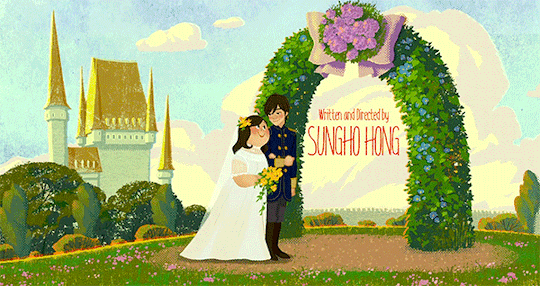
Chloe Grace Moretz accepted the role of Snow White immediately after she read the script and she recorded her lines (I think) in early-ish 2017. Her co-star Sam Claflin also immediately accepted the role of the romantic interest, Merlin, after reading the script and recorded his lines in (I believe) July 2017.
In the summer of 2017, the story and script were more or less the same as in the final movie. Promotional images from that time show that most of dwarfs had been completely redesigned by this point and didn’t have their teaser designs anymore.
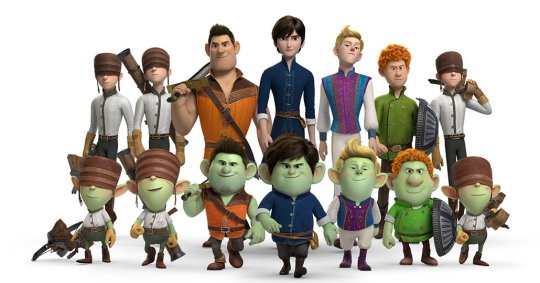
They also released a few screenshots that look exactly like the final film. The movie was advertised as coming out in ‘2018′ at this point. Here’s a promo image from 2017 that is MUCH more tactfully worded than the infamous Cannes poster:
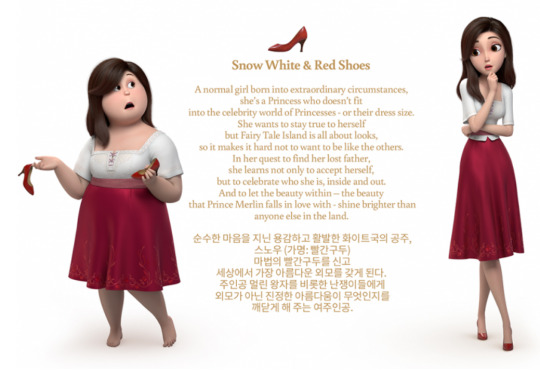
So now we’re in summer 2017. The Cannes Film Festival. The movie’s script and story have been basically nailed down, animation is underway, and the Korean film company Finecut is beginning to market and sell the movie to worldwide audiences. They are planning on showing some footage to potential buyers at the festival, and they make a poster to advertise the film there.
Unfortunately, it’s THIS POSTER:
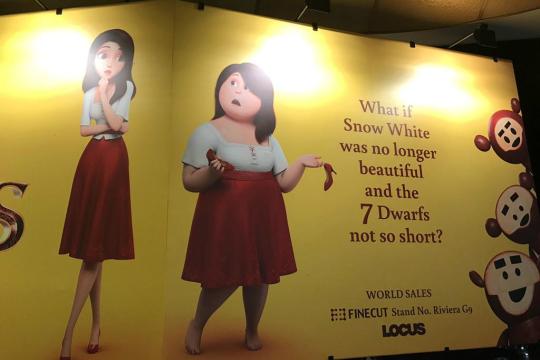
Now here’s where there are some unknowns. By this point, the movie is basically in its final form, which is an adorable, body-positive story about loving people for who they are, loving yourself for who YOU are, and that provides commentary on society’s standards of beauty and how they affect how people are treated/viewed. So why this poster??? All I can really tell is that someone (I think Finecut) really, REALLY messed up and either horribly mistranslated the tagline, or didn’t do enough research to know that this kind of thing is REALLY NOT OKAY in western culture.
The above picture is shared and the internet backlash begins, fueled by tweets from prominent body-positivity activists like Tess Holliday. Even Chloe Grace Moretz speaks out against it, because she of all people KNOWS that that’s not what the movie is about. The internet then finds the old teasers from before the movie was revamped and it makes things worse. Producer Sujin Hwang profusely apologizes and says that that is NOT the message of the movie. Locus pulls the advertising campaign, and takes down the two old teasers.
“Our film, a family comedy, carries a message designed to challenge social prejudices related to standards of physical beauty in society by emphasizing the importance of inner beauty.”
- Producer Sujin Hwang
Voice director Tony Bancroft also tried to explain the situation:
“The truth is the film has a body-positive message as its core theme–it’s the opposite of what reports are saying. The problem is one poorly translated movie poster that has been taken dramatically out of context.”
- Voice Director Tony Bancroft
And then... There was nothing for a while. The movie didn’t come out in 2018 and was delayed. From what I can tell, I DON’T believe this delay was related to the Cannes backlash. I think it was mostly due to Locus’s limited budget and resources, because as we know, animation is difficult, time-consuming, expensive, and easy to do badly but hard to do well. Also, probably with Jin Kim and Tony Bancroft’s influence, they REALLY wanted to make sure to do a good job with the animation because they now had a great story and they really wanted the movie to be a quality, worldwide hit that would kind of put South Korean feature animation on the map. Just take a look at how nice the final animation was:
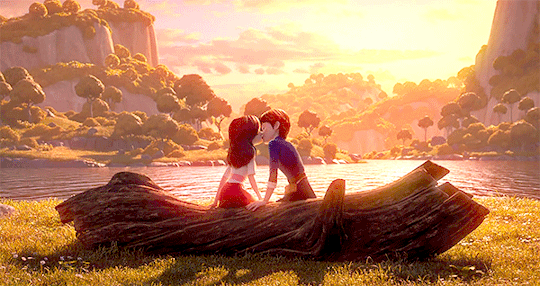
The movie was released in South Korea on July 25th, 2019. Unfortunately, the damage was done in the English-speaking markets and it was not released to an English-speaking audience until June 22, 2020, when it was released digitally in the UK. At the time of this post, there is no set US release date, but the distribution rights were recently bought by Lionsgate and the MPAA gave the film an official PG rating.
So who’s to blame? There’s no good answer. You could blame Locus for making those old teasers. You could blame Finecut for the competely tonedeaf Cannes poster. You could even blame cancel culture for raging against the movie based on one poster and two old teaser trailers without researching what the movie was actually about.
All I know is, it’s a damn shame.
#mooncactus#red shoes and the seven dwarfs#red shoes and the 7 dwarfs#animation#animation production#animation history#red shoes movie#redshoes#jin kim#tony bancroft
4K notes
·
View notes
Text
This may be an old article from 3 years ago, but these cultural aspects/observations still apply even today. And though this is strictly a Chinese perspective, a lot of these everyday life bits are observed in Overseas Chinese communities in countries such as The Philippines, Malaysia, Indonesia, etc. as well as countries heavily influenced by Chinese culture like Taiwan, Japan, and Korea.
I've always liked learning about other cultures and making comparisons between how things are done East vs West. Which probably stems from growing up with two cultures and Mom raising me on American movies xD
So the irony is if you asked me how many Chinese, Taiwanese, or Hong Kong actors I know, chances are I know as much as you do xD Like Jackie Chan, Andy Lau, and that's about it. But if you asked me about Western (specifically American and British) actors, then I have a useless brain dump of movie trivia and who was with who in what movie xD
Hmmm, both Taiwan and the Philippines are two distinct cultures but both look up to a certain country and are fascinated by that. In Taiwan's case, Japan and the US for the Philippines. In both cases, this is due to being under the rule of those countries in their history. Taiwan being under Japan for 50 years, and the Philippines being under Spain for 300+ years, followed by periods of American and Japanese rule. To put it simply though:
Taiwan is "mini-Japan with a very Chinese culture".
The Philippines is "former colony of Spain with lots of American influences".
But unlike the author, I've never set foot in any Western country, so my understandings are strictly what I've observed in media, which while it can be accurate, doesn't compare to actually experiencing the culture.
Some further elaboration on most points:
#1 We quite literally use chopsticks for everything. We use it to pick rice, viands, vegetables, fruit, smaller desserts, almost all the food you can think of.
But where do you put your chopsticks when you're not using them? Just put them on top of your bowl or flat on your plate. But do not ever stick them vertically. It's taboo, since it looks like incense sticks, which we use to pray for those who have passed, like our ancestors or during funerary services.
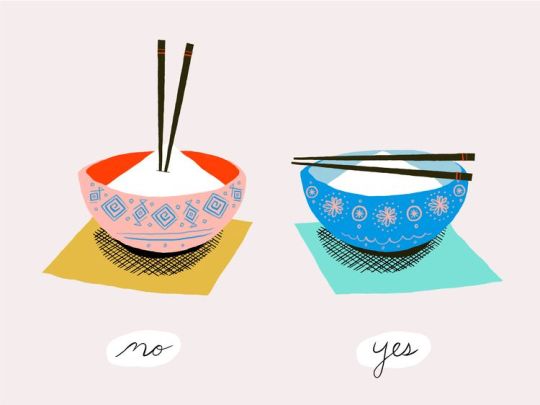
#3 The majority of Asia is obsessed with fair/white skin. In my time at the Philippines, I grew up watching all these Dove Whitening commercials and my classmates often commented on how fair my skin was, how they envied it etc. In Taiwan, girls often say they don't want to 變黑 (biàn hēi) 'become dark'. Japan and Korea too are not innocent of this either (if their beauty/skin products weren't a dead giveaway).
People here at Taiwan often mistake me for being from Hong Kong or Japan (as long as I don't speak Mandarin with my heavy accent xD). A Taiwanese classmate of mine joked that she often gets mistaken for being from Southeast Asia due to having a darker complexion. And while I laughed it off with her at that time, looking back, I now realize she was lowkey being racist. xD
And believe me Filipinas have mentioned literally being told 'your skin is so dark' here in Taiwan, or being given backhanded compliments like 'you're pretty despite having dark skin' and...*facepalms*
My point is, beauty is not exclusive to skin color. People who still think that are assholes.
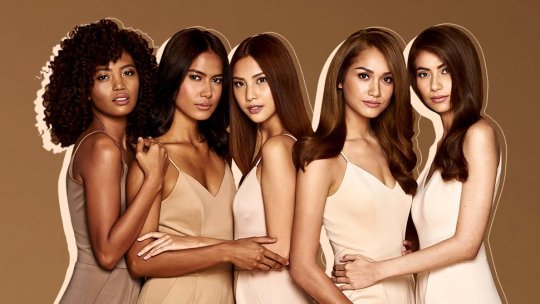
#5 Not to say we don't have salt and pepper, but yes soy sauce and vinegar are the classic condiments you see on the table, be it at home or at a restaurant.
And if I may add, Taiwanese love their pepper. xD If you ever get to eat at a night market or a smaller "Mom n' Pop-style" restaurant here, some dishes/soups tend to add quite an excessive amount of pepper. Not like anthills, but quite liberally and way more than average. Enough that you see traces of pepper at the bottom of the food paper bag or swirling in your soup. xD
#6 I know this all too well from personal experience. In my years of studying at Taiwan, I always had roommates. 3 in my first school (I graduated high school in the Philippines pre K-12 so I had to make up 2 years of Senior High), followed by 2 in college, with the exception of 1 in freshman year.
My college did offer single person dorms but at around 9000 NTD ($324) per month compared to around 6000 NTD ($216) per semester. Because I wanted to save, the choice was obvious for me xD. But ah, this doesn't mean I don't value personal space, in fact I love having the room to myself, and since both my roomies would go home to their families every weekend, weekends were bliss for me xD
And you don't have to be friends with your roommates (that's an added bonus however), you just have to get along with them. I was quite lucky to have really great roommates all throughout my schooling years.
#9 In the Philippines, we do. Owing mostly to American influences and maybe being predominantly Catholic? xD
#10 *sigh* Chinese parents and parents from similar Asian cultures tend to put too much emphasis on grades, so much that kids could get sent to cram school as early as elementary. This is because what school you get into could literally affect your future job opportunities, and while that's not exclusive to any particular country/culture, I feel it's especially pronounced here in Asia. I'm really lucky my own parents weren't that strict about it. However, if your parents don't point the mistakes out to you, chances are you'll do it yourself, if you're an Asian kid like me anyway. xD It just becomes a habit.
#11 My family is an exception to this. xD We do say 'I love you' directly, but complete with the 'ah eat well ok?', 'don't scrimp on food', 'sleep well' and similar indirect words/actions of affection. We were doing 'Conceal, Don't Feel' before it became popular. xD

#13 I'm kind of confused about this but this has sort have changed over the years in which eye-contact is now more encouraged. But don't stare, especially at elders and authority figures. Sometimes it's just shyness though. xD And I've observed this with my own Taiwanese friend, especially when I'm complaining or ranting to her about something. xD I'm a person who likes to express my opinions strongly, which tends to scare/alienate some of the locals here, as doing so is kind of frowned upon. Thankfully, she does listen and offers her take on things.
#14 Ah this. xD In the Philippines, this is a common greeting known as beso-beso, and I freaked out too when an auntie did that to me. xD Needless to say, Mom lectured me later on what that was. ^^"
#16 Along with #3 another crazy beauty standard. In my view, people always look better with a little meat on them and when they're not horribly thin. Asia still has a loonng way to go with accepting different types of bodies if you ask me. This combined with modern beauty standards has made the pressure for women especially to 'look beautiful' higher than ever.

I know many people love them but please, starving yourself or glorifying eating disorders is never OK just to get this kind of 'ideal' body. I'm not part of the Kpop fandom, but even I think when idols get bullied just for gaining the least bit of weight among other insensitive comments, that's really going too far.
#17 'If you want to make friends, go eat.' <- I couldn't agree more. In the Philippines we have a greeting: 'Kumain ka na ba?' (Have you eaten?) . Similarly in Taiwan, we have 吃飯了沒? (chī fàn le méi), both of these can mean that in the literal sense but are often used as greetings instead. By then which invitation to having lunch/dinner together may or may not follow. Food really is a way for us to socialize and to catch up with what's going on in each other's lives. Not to say we don't have regular outings like going out to the mall, going shopping, etc. but eating together is a huge part of our culture, be it with family or friends.
And while I'm at it, some memes that are way too accurate good to pass up xD
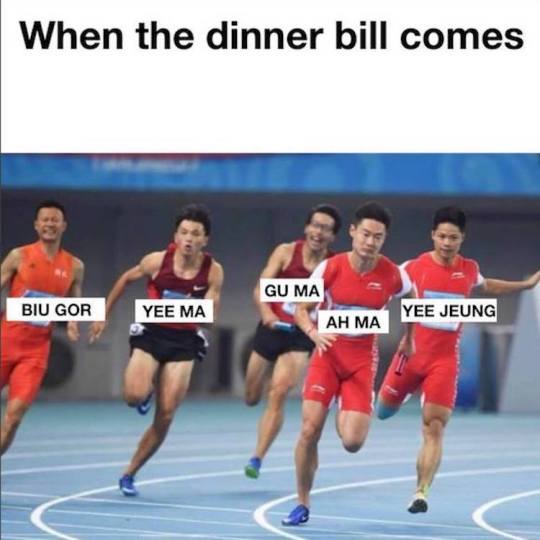
Parents, uncles, aunties alike will fight over the bill xD
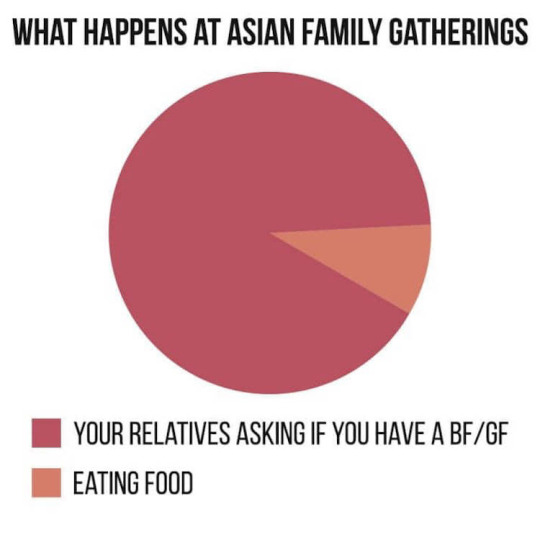
Alternatively:
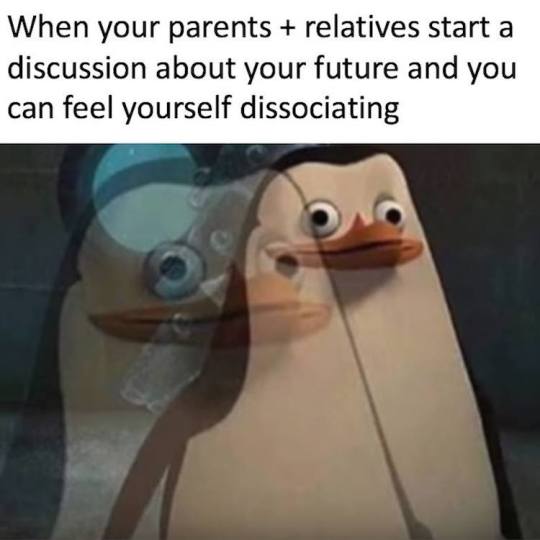
You just space out until your name is called xD
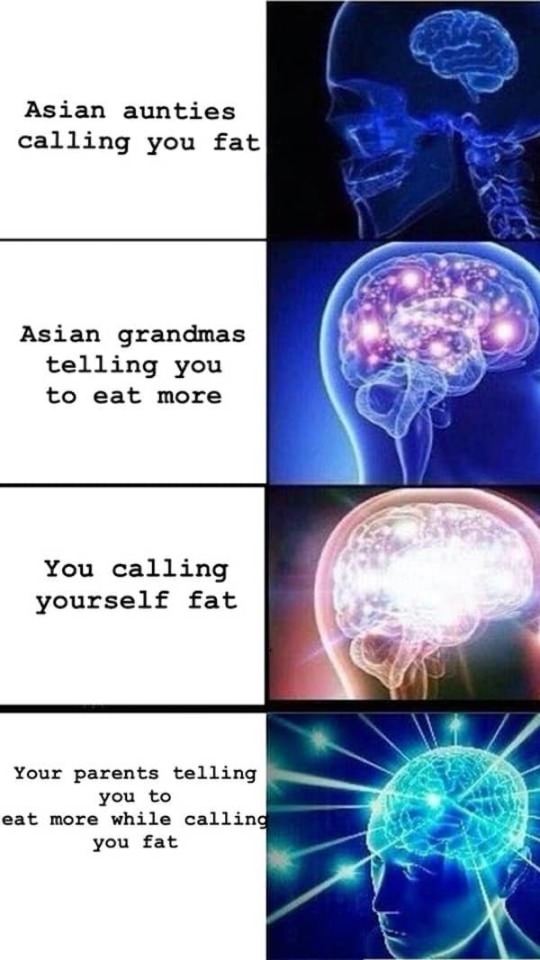
My parents are guilty of the last one. Logic how? xD
#18 True. xD I like giving compliments out to people but I have a hard time accepting them myself, though I've learnt how to accept them much more now than before. We're kind of raised to constantly downplay ourselves so we often say things like 'ah no no' or 'I'm really not that good'. The downside of this of course is that it can come off as somewhat fake. xD
Again from personal experience, that same classmate who made the lowkey racist remark, she was good, she was on the debate team, was a honor student, knew how to mingle with people, but she downplayed herself way too much, while praising me but I honestly thought that she never really meant it from how she treated me. She wanted to keep me around her yet make backhanded compliments at me and she didn't want me socializing with my other classmate who is now my friend. *sigh* It was only after discussing this with one of my roomies did I realize how this 'excessive downplaying' might come off to people like me who more or less grew up with a more 'Westernized' mindset. I'm not saying brag about your achievements but don't be overly humble about them either, which can also be a turn off.
#20 We do tend to be a lot more realistic on how we view things, neither entirely optimistic nor pessimistic. We try to think of things practically and often analyze things on pure logic. A downside of this however, is that Chinese people can be overly practical. Taiwanese for instance don't like to 'find inconveniences' and generally keep to themselves, meaning, they won't help you in your hour of need even when they do have the capabilities. Sounds really harsh I know, but in my 6 years of living in Taiwan, while this doesn't apply to all the people, a lot of them really do only find/talk to you when they need something.
So for some people saying Taiwanese are 'friendly', that's BS xD If you ask me, Filipinos are infinitely more friendly, and again while not all, generally make more of an effort to help you when you need it. I really felt more of a real sense of community during my years growing up in the Philippines compared to Taiwan.
#21 Children do tend to stay with their parents well into college and adulthood, since Chinese families are indeed very family-oriented, in a lot of cases, grandparents often live under the same roof as us as well! And it really does save a lot of money. I see there's a real stigma in the US when it comes to "living with your parents", but that's starting to change especially because of Covid and having more and more people move back in with their parents.
Housing unfortunately is pretty much hella expensive no matter where you go, and Taiwan is no exception. Steep housing prices and the very high cost of raising a child (schooling + buxiban fees, etc.) contribute to a very low birth rate and thus an aging population like Japan. It's not uncommon to see both parents working in Taiwan.
#23 I'm an overthinker myself, but I totally agree with the author that the best is to strike a good balance between these two. Which I guess is why I love drawing or any other related creative attempts, it helps me be more spontaneous or well, creative! I like to remain intellectually or artistically inspired.
#24 Is French high school really like that? xD My friend did watch SKAM France and more or less got a culture shock from what was depicted on the show. I can confirm however that most high schools both in the Philippines and Taiwan require students to wear a uniform, only in college is everybody free to wear casual/civilian clothes.
#26 Ah this is part of our Asian gift-giving etiquette xD We always open gifts later after the event/meeting and in private. Never open them in front of the person who gave it to you or in front of others. This is to prevent any 'shame/embarrassment' that may result both to yourself and to the gift giver. I know this may come off as something weird since some people may want a more honest response or immediate feedback when it comes to gift-giving, but that's just how it is in our culture. You're always free to ask us though (in private) if we liked the gift or not ^^"
#28 I want to say the same goes to drinking, partying, and drugs however xD Those are things which are still frowned upon in our culture. And to be honest, whenever I see those in movies, it does kind of turn me off xD It doesn't mean that we're "uncool" or "boring", we just think that there are much better or healthier ways of "having fun".
#31 Is this true in France?! Man I would kind of prefer that instead of people being on their phones all the time xD This kind of goes with #20 in that Chinese are overly practical or logical, and don't read fiction as much as nonfiction. My Taiwanese friend is an exception though, she's a bibliophile who loves the feel of paper books compared to e-books, and it's a trait of her that I like a lot. Both the Philippines and Taiwan however have a huge fanbase when it comes to manga and anime though.
I'm all for reading outside of "designated reading" at schools especially. Reading fiction improves your vocabulary too, and can be quite fun! It helps you imagine and really invest in a world/story, and if you ask me something that I feel Westerners are better at, they're more in touch with their emotions and creativity, and are thus much more able to write compelling or original stories. Believe me, I've seen a fair amount of Chinese movies that rip off Western movie plotlines xD
#33 Nothing much to add on here..except that since I'm a "weird" person, Mom often jokes that she got the wrong baby from the hospital. xD
#35 True. While I agree with the care and concern that your fellow community can give you, the downside of this is we tend to only hang out with our own people, e.g Chinese with Chinese, Taiwanese with Taiwanese, etc. I've seen too that it's especially hard to make friends in Japan and Korea as a foreigner. Not only is there the language barrier, but the differences in culture too. In a way, Asians can be pretty close-minded on getting to know other cultures or actually making friends with people from other countries. I know this all too well being half-Taiwanese/half-Filipino, being neither "Filipino" enough nor "Taiwanese" enough. xD It's more of people here being too used to what they're comfortable with.
#36 Oh this is something I feel that Chinese students and other students from similar cultures should really improve on. xD How will people respect you if you don't speak your mind?
I felt bad especially for my Spanish teacher in college, granted it was an introductory course (Spanish I and II) but the amount of times that our teacher had to prompt a student to recite/speak even with clear hints already made her (and me too) extremely frustrated. The thing is, these are college students, I personally feel they don't have any reason to be so shy of speaking and technically by not doing so they're slowing the pace of the class too much and a lot of time is wasted.
Unfortunately you can't always be very vocal with your thoughts and opinions in most Asian cultures. I would say strive for that, but at the same time, play your cards well, especially if you're in a workplace setting.
If you made it to the end, thank you for reading and here's a cookie! 🍪 I'm not perfect and there's bound to be something I missed so please let me know if you spotted anything wrong. Feedback/questions are very much welcome and please feel free to share about your country/culture's differences or similarities!
#asia#asian#culture#asian culture#chinese#chinese culture#east asia#china#taiwan#japan#korea#southeast asia#philippines#malaysia#indonesia#thailand#vietnam#travel#I didn't tag every country due to a lack of understanding or not meeting or being around people of that country#I know I shit on Taiwan a lot but believe me Taiwan has a lot of good parts too - it's just that it focuses too much on those now xD#and there are too many YouTube videos that only talk about the good parts of Taiwan - and while those are true#I felt that by not being honest with some very serious faults - it doesn't give a fair/clear perspective to others#especially people who in the future may want to work/travel here
54 notes
·
View notes
Text
Little Mix on what it takes to survive being the most bullied band in pop
Still teenagers when they were catapulted to fame, superstardom came at a price for Little Mix. They open up to Francesca Babb about the soaring highs and crashing lows of the past nine years.
It is the end of our YOU cover shoot, and I am facing the lesser-spotted sight of a barefaced Little Mix. Wet wipes swipe back and forth across their faces and, as the foundation departs in a deluge of coffee-coloured tissues, Jesy Nelson and Leigh-Anne Pinnock, both 29, and Jade Thirlwall and Perrie Edwards, both 27, visibly relax into their tracksuits and boyfriend jeans, shoulders dropping as they settle into themselves. I’m so used to seeing them contoured and camera ready that I assumed full glamour was their happy place. But perhaps the real Little Mix are not the war-paint-and-leotard-clad pop stars we’ve spent almost ten years watching grow up, but rather the four women they have become behind the glare of the spotlight. It’s those four women that I’m intrigued to meet.
Since winning The X Factor nine years ago, there have been highs – selling over 50 million records globally, a significant percentage of which were self-penned, and creating enough accompanying make-up lines and merchandise to keep them and their families comfortable for the foreseeable future (recent reports suggest they have earned a combined £28.5 million to date). But there have also been lows – perpetual picking apart by both the public and the press, bullying and vitriol from online trolls. The most extreme cases of which led Jesy to attempt suicide during Little Mix’s early days in 2013 (she regards a tweet from the controversial Katie Hopkins – ‘Packet Mix have still got a chubber in their ranks. Less Little Mix. More Pick n Mix’ – as the ‘pinnacle point’ for her depression) and pushed Perrie into an ongoing struggle with anxiety.
Fame has changed them. In some ways they are still youthful and silly – dropping phrases into conversation that wouldn’t be out of place in a playground – yet, in others, they are wise beyond their years, diving headfirst into battles on feminism, race and mental health. They’re fun enough to be light relief, smart enough to inspire a generation struggling with the pressures of youth and social media even before a pandemic was thrown at them, and ballsy enough to leave Simon Cowell’s record label because they didn’t feel he had their best interests at heart.
‘It’s never really been a cruise, has it?’ Jade ponders, a copy of social activist Bell Hooks’ 2002 feminist theory Communion: The Female Search For Love in her hand (not for show, I might add; when I ask her about it, she is well versed in its content). ‘It’s either been a really big high, or a really big low.’
Jesy, who has found herself the target of some of the cruelest contempt from the world outside Little Mix, agrees: ‘Some of the best times, some of the worst times.’
Comments on her weight, her looks, her place in the band, comments that she should take her own life, all led her into a deep depression and the aforementioned suicide attempt. Her documentary last year, Jesy Nelson: Odd One Out, revealed her journey through it all and, while harrowing, it is essential viewing on the realities of growing up in a world dominated by social media.
‘Before we got in the group, I never looked at myself and thought, “I don’t like that” – I don’t think any of us did. I never thought, “Oh god, I’m fat”, and then we got in the industry, and we all started wanting to change things about ourselves. It’s so sad. There are things [in the past] I definitely wish I hadn’t done,’ she says, referring to the suicide attempt, in which she took an overdose after a two-year battle with depression and an eating disorder. ‘But would I be the person I am today if I hadn’t gone through all of that?’
‘There was a time when it was worse than it is now,’ adds Leigh-Anne, who has increasingly used her own Instagram channel to vocalise her experience of racism, both overt and underlying, throughout her time in the band. ‘I guess we’re taking steps forward, but I fear for my [future] daughters…’
‘It makes me not want to have a kid,’ agrees Jesy. ‘Those insecurities that we all have now because of social media, imagine having that embedded in you as a child?’
Before you write them off as four very lucky girls ungratefully complaining about a lifestyle so many dream of, I should point out that they are fully aware of the paradox of their privilege. I suppose the point is, it’s not too much to ask to not be bullied to the point of hospitalisation as a by-product, is it?
‘Little Mix has changed our lives for the better, and our families’ lives, and we have achieved so much,’ says Perrie.
‘Don’t get me wrong,’ agrees Jesy (a warning I will hear repeatedly throughout our hour together, perhaps thanks to almost a decade of their quotes being blasted out of context for click-bait). ‘I’m not going to sit here and say we’ve got a terrible life, because we haven’t, but I do think our innocence was taken from us.’
It’s a while since the girls last did any press. Lockdown saw a halt to any activity they had planned, including the launch of their new talent show, BBC1’s Little Mix: The Search (in which they, well, search for a new band to mentor and join them on tour). But the time apart has not diminished their ability to finish each other’s sentences and jump to each other’s aid. It has, it seems, been really rather good for them and allowed them to come back fired up for the release of their sixth album, Confetti, which came out this week. ‘It was needed,’ agrees Jesy. ‘We’re never not with each other and we’re always busy. Our mornings start early, we finish really late.’
Being at home has meant more time spent with their families, with Jade even starting her own show on MTV with her mum Norma. Called Served!, the self-filmed series saw the pair interview celebrity drag queens and challenge each other to cooking competitions. ‘I love drag culture,’ she says, ‘and me mam was by herself in lockdown, so I thought it’d be something nice to keep her entertained.’
‘Your mum could be on Loose Women,’ Leigh-Anne muses.
‘Imagine our mams on a show!’ shrieks Jade.
‘Nobody else would get a word in edgeways with my mam,’ laughs Perrie.
‘Ooh, when Debbie goes off on Twitter,’ says Jade, of Perrie’s mum’s habit of weighing in on comments from haters. ‘My mam will text me, have you seen Debbie’s been going off on someone!’
It is interesting that all four talk frequently about their mums throughout our chat, and yet there is no mention of fathers. While their mums often appear on Instagram, a sighting of Perrie’s dad on her 23rd birthday was extremely rare. Perhaps the Little Mix dads’ absence in the narrative is because the four girls were predominantly raised by their mothers (all of their parents separated when they were younger), and another reason the group’s bond is so tight. Little Mix are each other’s wall of arms, their own personal bodyguards. Jesy, they unanimously agree, is Scary Mix (although I find her a delight), which is interesting given her own inability to bat off other people’s words.
‘When it’s you on your own dealing with something personally,’ Jesy says, ‘It’s completely different. You feel so vulnerable alone, but we are a force when we’re together.’
It’s not hard to see, in today’s social-media obsessed society where there is little retribution for cruelty, why four attractive, successful young women, with attractive, successful young boyfriends (two footballers – Perrie dates Liverpool’s Alex Oxlade-Chamberlain, Leigh-Anne is engaged to Watford’s Andre Gray – while Jade is with Rizzle Kicks singer Jordan Stephens and Jesy is going out with Our Girl actor Sean Sagar), who seem to be living a dream life have found themselves at the heart of a whirlwind of vitriol. There was the infamous spat with Piers Morgan, in which he mocked them for posing naked but for the insults that have been hurled at them painted on their bodies. He accused them of using sex to sell records and called them ‘foul-mouthed, talentless, clothes-allergic little dimwits’, which is not how I find them to be.
‘I take Piers with a pinch of salt,’ Jesy says, rolling her eyes. ‘He does it to cause drama, so I take no notice. When we won The X Factor, we didn’t look like a generic girl band: we’re all different shapes and sizes, we didn’t dress sexy, so immediately everyone was, “What’s this?”’
‘Usually, when you see a girl band, they’re perfection, they have six-packs – and we didn’t,’ continues Jesy. ‘People saw us as kids, so even though we’re now women, people still think of us that way, so when we come out on stage in leotards, they think, “That’s disgusting!”’
‘One Direction didn’t get the s**t we get, because they’re men,’ states Leigh-Anne. ‘It’s like, “They’re four girls, let’s come at them”. As soon as it’s girls, they think, “Oh you slag.”’
‘When it’s men, it’s celebrated, but the minute women sexualise themselves and feel powerful doing it, we’re told to rein it in,’ adds Jade. ‘We’re conditioned to think that women are there to be these innocent and pure beings and the minute you step out of that, it’s carnage.’
Little Mix, however, are not scared of embracing that carnage and of sparking a debate. For their show The Search, Jade describes how it was important for them to set the tone on respect when each new person auditioned. ‘Because we are small women, it’s important to show people that they need to respect us, that we know what we’re talking about and we need to be listened to,’ she says.
‘There’s no nastiness,’ continues Jesy about the show, which has been praised for modernising and freshening up the age-old TV format. ‘There’s no making anyone feel uncomfortable for entertainment.’
They also insisted a large part of their budget be dedicated to looking after the contestants’ mental health, understanding, first hand, the pitfalls of talent shows.
The Search is not their first attempt at diversifying their talent. As a group, they have LMX make-up line and also a perfume, Style By Little Mix. Subsequently, they have become expert businesswomen, refusing to make the mistakes of pop groups past, so often left completely penniless at the end of their careers.
‘I remember walking into an early label meeting and saying, “This is who we want to be, this is the campaign we want, this is the imagery we want,”’ says Jade. ‘We knew our brand from the get go and we very much steered that ship.’
It’s a long way from their (as Jesy puts it) ‘working-class backgrounds’. Since joining the band, each one has bought their mum a house and, while their tale is not entirely rags to riches, the jump from Primark to Prada in recent years has certainly been significant.
When it comes to business, Perrie describes herself and Leigh-Anne as the ones who will often seek a compromise in difficult situations, while they send Jesy and Jade in when deals need to be made.
‘Jesy’s the badass,’ Perrie laughs. ‘Whenever I’m scared, I’ll stand behind her. She’s the one who puts her foot down in a boardroom full of men and says, “It’s going to be this way.” But we pick our battles. We don’t just argue about every decision – it’s when we feel we have to.’
‘Nobody could say that we are difficult, and if they do, they’re lying,’ says Leigh-Anne adamantly. Adds Jesy: ‘We know what we want, and we know what kids want.’
Little Mix have lived over a third of their lives in the spotlight. They’ve seen how things work, how things don’t, and they’ve learnt how to cope with it all. The lows may have been spectacularly low, but the highs have surpassed any of their expectations. Their story is not your classic fairytale, but it’s one they have learnt they can write their own ending for. If the Little Mix I meet today is anything to go by, I wouldn’t expect that ending to come any time soon.
Little Mix’s new album Confetti is out now. Their movie LM5: The Tour Film will be in cinemas nationwide on 21 and 22 November.
65 notes
·
View notes
Text
Gender Theory
Readers, let us begin with a simple question- what is gender?
The Biological Theory Of Gender, and a majority of society, would say that gender is defined by biological sex, namely hormones and chromosomes. If you release estrogen and have XX chromosomes, you are female, and if you release testosterone and have XY chromosomes, you are male. However, this is an extremely flawed vision of gender for two reasons: one, that whatever proof of hormones altering gendered behaviour has been found only in lab rats1, which possibly will not exhibit the same extreme change in behaviour if the hormones were administered to them naturally in their own environment- and rats are not human- we have far too many differences as species for this study to be considered valid for homosapiens as well. And two, chromosomes are not strictly XX or XY- around 1 percent of the world population is intersex (and a similar percentage is redheaded, so its not inherently ‘anomalous’ or ‘unnatural’) , which means that they can have chromosomal variations such as XXY, X, XXXY etc, all of whom develop differently as compared to people with the traditional chromosome combinations.
Further, there are far more things that define ‘biological sex’, namely:
chromosomes
gonads
sex hormones
internal reproductive anatomy (such as the uterus)
external genitalia.
Out of these, in humans, genitalia and internal reproductive anatomy can be changed without there being a significant change in gendered behavior. Sex hormones, when administered to bodies change secondary sex characteristics more than any sort of behavior; with the exception of testosterone increasing sex drive and sometimes increasing ‘ego’. Every single part of this definition of binary biological sex is challenged by the existence of intersex people, henceforth proving that sex is not binary and never has been, unfounding the existence of a sex-based gender binary in itself. Further, transgender individuals have a completely different gender identity as compared to their biological sex, and it has been scientifically proved that this is because their brains develop in the same way the brains of the children of the gender they identify with do. That essentially means that the brain of a transgender woman develops similarly to the brain of a cisgender woman, and the brain of a transgender man develops in the same way the brain of a cisgender man develops. All in all, there are far too many differences in the experience of biological sex to confine it to a binary, hence unfounding the theory that gender is based on biological sex.
Then how do we define gender?
There are a number of theories, but the most logical one at the moment would be Judith Butler’s Theory of Gender Performativity. Butler says that gender, as an abstract concept in itself, is nothing more than a performance. We ‘perform’ our gender by carrying out actions that we associate with it. They further say that this does not mean that it’s something we can stop altogether, rather something we’ve ingrained so deeply within us that it becomes a part of our identity, and it's the part of it we call gender identity. Gender, hence, is created by its own performance.
Butler also implies that we do not base gender on sex, rather we define sex along the lines of established lines of binary gener, i.e. male and female- despite the fact that more than 10% of the population does not fall into this binary sex, and has some variation in their biological sex that does not ‘fit’ into either category. Gender in itself is so culturally constructed by western society that anyone who does not perform their assigned gender ‘correctly’ is punished- this applies to not only queer individuals but even men who do not ascribe to or criticise predefined ideals of masculinity. They are made social pariahs and excluded as outcasts, leaving them to find and create their own communities and safe spaces. This is shown in the way society ostracises queer-presenting individuals, makes fun of ‘soft’ men, and forcefully tries to ‘fix’ intersex children whose variations in biological sex cause no harm to them. I quote:
“Because there is neither an ‘essence’ that gender expresses or externalizes nor an objective ideal to which gender aspires; because gender is not a fact, the various acts of gender create the idea of gender, and without those acts, there would be no gender at all. Gender is, thus, a construction that regularly conceals its genesis. The tacit collective agreement to perform, produce, and sustain discrete and polar genders as cultural fictions is obscured by the credibility of its own production. The authors of gender become entranced by their own fictions whereby the construction compels one’s belief in its necessity and naturalness.”
One of the criticisms of Butler’s theories is that it does not seem to apply to transgender individuals, whose innate gender identity is not the one that they have been assigned to perform at birth; whose brains develop the same way that their cisgender counterparts’ brains do from birth. Butler themselves have responded to this, saying:
“I do know that some people believe that I see gender as a “choice” rather than as an essential and firmly fixed sense of self. My view is actually not that. No matter whether one feels one’s gendered and sexed reality to be firmly fixed or less so, every person should have the right to determine the legal and linguistic terms of their embodied lives. So whether one wants to be free to live out a “hard-wired” sense of sex or a more fluid sense of gender, is less important than the right to be free to live it out, without discrimination, harassment, injury, pathologization or criminalization – and with full institutional and community support.”
Later on, Butler goes on to say that the main point of their theory is that identity is constructed, which means that it allows us to change how we view it as a concept. It leaves room for us to subvert gender roles, challenging the status quo on what it means to identify as someone of a particular gender, and re-structuring society such that we rally for change not along gender lines, rather on the basis of what’s right.
Further, if we combine the work of the psychologist Sigmund Freud with Butler’s theories, the latter does actually apply to transgender individuals. Freudian theory states that we internalize concepts of gender based on our parental figures at birth. That is, if you are born female, you begin to look towards the person who closest resembles your gender identity; which in this case would be your mother, to be your role model for your behavior as to how women are meant to act. Your mother would be your guide to how you perform your gender. If she crosses her legs, you cross your legs. If she dresses in a particular way, you would too, until you were exposed to the exterior world and allowed to develop your own sense of style. As such, you create your own gender identity within your mind, and perform that identity the way you have been taught to by your maternal figure. When you are transgender, you view yourself as innately as the gender you identify with, hence you base your gender identity off the parental figure of that particular gender. This means, if you are female to male trans, you would base your gender identity on your father, and accordingly perform your gender in that way.
Now the question arises: How do we create gender identity outside of gender roles? How do we identify anywhere on the gender spectrum while abandoning the performance that comes with that identity? Why is it important?
Well, the answer isn’t simple. For its importance, I allude, once again, to gender performativity theory- Butler even uses some evolutionary stances to support her views, saying that gender performance stems from gender roles which stem from the fundamental differences between the prominent male and female sex at the very beginning of evolution. Now that 'evolutionary' behaviors don't matter at this stage of societal, cultural, and psychological development, it renders gender roles and hence the performance of gender redundant. However, we still perpetuate these ideas regardless of their importance, or rather their lack of such. And in this process, we end up defining and segregating far too much on the basis of gender- from small things like friendships to even the feminist movement, which is majorly perpetuated and held up by people who identify as female. Other groups like men end up purposely excluding themselves from a movement that can benefit them as well(through deconstructing and eradicating ideas of toxic masculinity) just because of how strongly it is divided on the basis of gender lines. And as for how we create gender identity outside of gender roles; it takes a lot of work, at first, to unlearn all the biases you have internalized about what it means to be a certain gender. You have to actively work towards deconstructing what gender and gender identity means to you, and how much of it comes from societally misguided stances about the ‘role’ of a gender is. It may mean ridding yourselves of the school of thought that women belong in the kitchen and men belong in workplaces or even identifying and removing hidden biases such as those of toxic masculinity and/or toxic femininity. Lastly, it takes an understanding that often, gender expression is not the same as gender identity; and also that most gender expression is how people show how they feel the most comfortable viewing themselves. Once you’ve managed to deconstruct your biases, it’s just a matter of how you feel comfortable viewing and expressing yourself; and what label, among the myriad, you identify with the most. That would be your unique self-expression and identity.
#gender theory#gender#trans#trangender#lgbtq#judith butler#writing#essay#article#write#writers on tumblr#gender identity#theory#sociology#psychology
25 notes
·
View notes
Video
youtube
This week on Great Albums: a fresh look at quite possibly the 80s’ most hated band, A Flock of Seagulls! Spoiler: their music is good, people in the 90s and 00s were just mean. If you want to find out more about how having the absolute best hair in the business ended up backfiring on these poor sods, look no further than my latest video. Or the transcript of it, which follows below the break!
Welcome to Passionate Reply, and welcome to Great Albums! Today, I’m going to be diving into a discussion of quite possibly the most derided and lambasted music group of the 1980s: A Flock of Seagulls. With a strange name, a perhaps painfully stylish aesthetic, and equally trendy and of-the-moment music, that was, for a time, inescapable in popular culture, their legacy forms a perfect target for the ridicule all popular things must face in due time. But even moreso than that, I think A Flock of Seagulls have become not only a punchline in and of themselves, but also a summation of everything that was dreadful and excessive about the early 1980s, with its “Second British Invasion” of synthesiser-driven New Wave. I can think of no better example of this kind of abuse than a famous line from the 1999 comedy film, Austin Powers: The Spy Who Shagged Me. The film is largely a love letter to the 1960s and its Mod aesthetics, and the protagonist, a super-spy unfrozen from this era in time, dismisses the history and culture of the 1970s and 80s as nothing more than “a gas shortage, and A Flock of Seagulls.” But at the time of this writing, we’re about as far away from Austin Powers as the film was from the release of this album, the band’s 1982 debut LP, so I think it’s been long enough that we can start to re-evaluate A Flock of Seagulls’ rightful place in music history.
While this self-titled album was the group’s first long-player, their first release was the 1981 single “It’s Not Me Talking.” Notably, this track was actually produced by the legendary Bill Nelson, who also released it on their behalf via his personal label, Cocteau Records. Ever since discovering this for myself, I’ve found the connection between Nelson and A Flock of Seagulls fascinating, and also satisfying. Despite the gulf between their respective reputations, I do think their work has a lot in common, at the end of the day: swirling washes of synth disrupted by screaming guitars, not to mention that shared interest in Midcentury rock and roll aesthetics.
Music: “It’s Not Me Talking”
These two acts would, of course, go their separate ways shortly after, and they ended up in completely opposite camps, with Nelson becoming a cult favourite with little crossover success, and A Flock of Seagulls going on to create what is, undoubtedly, one of the most iconic songs of the entire decade.
Music: “I Ran”
What does one even say about a song like “I Ran”? Over the years, it’s certainly gotten somewhat overplayed, but I can’t really hold that against it. It’s just a damn good song. Both ethereally menacing as well as catchy and rather accessible, “I Ran” takes the atmosphere suggested by “It’s Not Me Talking” and kicks it into another gear, with a harder-hitting hook and the introduction of that highly distinctive and of-the-moment echoing guitar effect. Some will hear it as little more than evidence that the song is hopelessly dated, but I’ve never thought of it as anything other than satisfying to listen to. If you ask me, I figure all art that exists is essentially “a product of its time”--nobody ever said Michelangelo Buonarroti’s David was a lousy sculpture, just because you can easily tell it was made during the Italian Renaissance. At any rate, I’d encourage everyone reading to go back and listen to it again, trying to maintain a little neutrality. I’d recommend the album cut of it, which is significantly longer than the single version, and features a rich intro that sets the scene before that famous guitar ever makes an appearance, which I think really adds to the experience. By some reckonings, A Flock of Seagulls are sometimes considered a “one-hit wonder,” but while they certainly are remembered chiefly for “I Ran,” this album’s other singles were moderately successful as well.
Music: “Space Age Love Song”
“Space Age Love Song” is perhaps the band’s second best-remembered single, and takes their sound in a markedly different direction than that of “I Ran.” “I Ran” won popular acclaim by finding a new home for the guitar, in the midst of a sea of synth, and pushed A Flock of Seagulls into a similar space as acts like the Cars and Duran Duran, who had enough mainstream rock sensibilities to sneak a lot of synthesiser usage onto American rock radio...much as one might sneak spinach into tomato sauce when feeding picky children. But I think “Space Age Love Song” is much more palatable to listeners of pop, synth- or otherwise. It’s softer in texture, and really almost dreamy, capturing the hazy, buoyant feeling of limerence as well as any pop song ever has. I’m tempted to compare it to another synth-driven classic, whose influence towers over this period in electronic music: the great Giorgio Moroder’s “I Feel Love.” Much like “I Feel Love,” “Space Age Love Song” combines simple, almost banal love lyrics with an evocative electronic soundscape, painting a picture of an enchanting, high-tech future where human feelings like love have remained comfortably recognizable across centuries or millennia. A similar theme of futuristic love pervades the album’s second single, “Modern Love Is Automatic.”
Music: “Modern Love Is Automatic”
While “Space Age Love Song” uses simplistic lyricism to portray the relatable universality of falling in love, “Modern Love Is Automatic” gives us the album’s most complex narrative. In a world where “young love’s forbidden,” we meet a pair of star-crossed lovers prevented from being together by some sort of dystopian authority. The male member of this union, introduced as the “cosmic man,” is apparently imprisoned for the crime of loving, but the text suggests that he may escape from this prison--or, perhaps, even be freed from it. The title, repeated quite frequently throughout the track, is perhaps the mantra of this anti-love society, a piece of propaganda being drilled into us as thoroughly as it is into these subjects: Modern love is automatic, with no need for messy, unpredictable human input.
It’s also worth noting that the song is consciously set in “old Japan,” deliberately locating it in the “exotic” East. While East Asia was strongly associated with refined, perhaps futuristic culture, I can’t help but think there’s a more pejorative sentiment operating here, rooted in stereotypes of Asian cultures unduly policing sexual freedom, and other forms of personal expression and self-determination. Ultimately, despite its futuristic trappings, “Modern Love Is Automatic” isn’t really a song about technology at all, but rather authoritarianism. “Telecommunication,” on the other hand, engages more directly with that theme.
Music: “Telecommunication”
“Telecommunication” was also released prior to the self-titled album proper, and was also produced by Bill Nelson. While structurally similar to “Modern Love Is Automatic,” with an oft-repeated title, brief verses, and a generally repetitive musical structure full of meandering guitar, its text quite plainly discusses the titular field of technology, in a seemingly non-judgmental fashion--though it could be argued that the fairly upbeat music suggests a positive outlook on things like radio and TV. The one hitch in all of it is the very end of the last verse, which sets the song in the “nuclear age”--a nod, perhaps, to the darker applications of 20th Century technology. “Telecommunication” is perhaps indebted less to figures like Moroder, and moreso to Kraftwerk, who first solidified the rich tradition of stoic synth thumpers about everyday machines like cars, trains, and, of course, nuclear energy. I’m also tempted to compare it to an earlier work of Bill Nelson’s group Be-Bop Deluxe, “Electrical Language,” another bubbly number that playfully bats this concept back and forth.
The theme of “quotidian technology” is also present on the cover of this album, which features an interior shot of a living room, centered around a television set. The TV displays a figure playing guitar--perhaps one of those heroic rock pioneers of the Midcentury like Buddy Holly, whom Nelson was so keen to imitate. But what’s most immediately striking about this cover is its beautiful colour palette, full of deep, saturated jewel tones, treated softly with an “airbrush” style effect. Despite being a somewhat mundane scene, the image also features fanciful, imaginative touches: the floor of this room is actually a miniature beach landscape, with the “floor” beneath the TV actually being the surface of the ocean, and the TV appears to be surrounded by a colourful, glowing group of birds. Given the beachy surroundings, we could perhaps interpret them as the titular seagulls. It’s tempting to think of this scene as a representation of how technology can sweep us away, out of our everyday existence and into something richer and more exciting.
But perhaps it’s not so simple--note also the open window in the top left, whose curtain appears to be agitated by some sort of motion in the air. Perhaps these birds are not the products of television fantasy, but rather have flown in from the window, and hence hail from the “real world?” Given how tracks like “Space Age Love Song” and “Modern Love Is Automatic” tackle the theme of the mundane meeting the fantastical, I think this complex and arresting image is a great fit for the album.
While their self-titled debut spawned multiple recognizable hits, A Flock of Seagulls never came anywhere close to recapturing its success. For the most part, they struggled to remain relevant as time wore on, largely abandoning the sonic footprint of their first album, and chasing after new trends in music technology such as digital synthesisers. They would eventually break up during the mid-1980s, and though they’ve reunited in order to perform live several times, the book is probably closed on A Flock of Seagulls. Personally, I can’t help but wonder what might have been if they had stuck to their musical roots a bit more. You get a bit of that on their third LP, 1984’s The Story of a Young Heart, which thankfully brings back that iconic echoing guitar, and does so without sounding too much like a simple retread of “I Ran.” Out of all their other work, it’s the album I would most recommend to admirers of this debut LP.
Music: “Remember David”
My favourite track on A Flock of Seagulls’ debut LP is “Messages”--not to be confused with the track of the same name by Orchestral Manoeuvres in the Dark! Moreso than anything else on the album, “Messages” has this aggressive, insistent, driving quality, and feels less like yacht rock, and more like punk rock. Despite not being released as a single, I think it’s a very strong track that’s quite easy to get into. That’s everything for today--thanks for listening!
Music: “Messages”
16 notes
·
View notes
Text
New Colin Morgan Interview with Edge Media Network about Benjamin - UPDATED
I am reblogging this because, after the author was made aware of an error in the posting of his article (if anyone clicked through to read it on the site, there was a whole question and answer that was repeated), the error was corrected and another three questions and answers were added! I am correcting it here, but they were very interesting, so I suggest you read the full article again!
I shall post the link at the bottom, but I wanted to type it out so that non-English speakers could more easily translate it. (This article was listed in their “Gay News” section of the site, hence the focus on the gay roles.)
British Actor Colin Morgan: How the Queerly Idiosyncratic ‘Benjamin’ Spoke to Him
by Frank J. Avelia
In writer-director Simon Amstell’s sweet, idiosyncratic, semi-autobiographical comedy, “Benjamin,” Colin Morgan plays the titular character, an insecure filmmaker trying to resuscitate his waning career (at least it’s waning in his mind) after one major cine-indie success. Benjamin is also doing his best to navigate a new relationship with a young French musician (Phenix Brossard of “Departures”).
Thanks to the truly endearing, multifaceted talents of Morgan, Benjamin feels like an authentic creation--one that most audiences can empathize with. Sure, he’s peculiar, has a legion of self-esteem issues and an almost exasperating need for acceptance as well as an inconvenient talent to self-sabotage the good in his life. But who can’t relate to some or all of that?
“Benjamin” is one of the better queer-themed films to come out in recent years, in large part because it eschews emphasis on the queer nature of the story. Instead, the film is a fascinating character study with Morgan slowly revealing layers and unpacking Benjamin’s emotional baggage.
Morgan is a major talent who has been appearing across mediums in Britain for many years. His London theatre debut was in DBC Pierre’s satire, “Vernon God Little” (2007), followed by the stage adaptation of Pedro Almodovar’s “All About My Mother” (2007), opposite Diana Rigg. Numerous and eclectic stage work followed (right up until the Corona shutdown) including Pedro Miguel Rozo’s “Our Private Life” (2011), where he played a bipolar gay, Jez Butterworth’s dark comedy, “Mojo” (2013), Arthur Miller’s “All My Sons” opposite Sally Field (2019), and Caryl Churchill’s “A Number” (2020), to name a few.
His TV work includes, “Merlin” (playing the wizard himself), “Humans” and most recently, in a very memorable episode of “The Crown”. Onscreen he can be seen in “Testament of Youth”, “Legend” with Tom Hardy, “Snow White and the Huntsman” and Rupert Everett’s take on Oscar Wilde, “The Happy Prince.”
He’s played a host of gay roles in the past on stage, screen and TV.
EDGE recently interviewed the star of “Benjamin” about the new film and his career.
Why Benjamin?
EDGE: What drew you to this project and were you part of its development?
Colin Morgan: It’s always the strength of the script for me on any project and Simon’s script was just so well observed, he managed to combine humor and poignancy in delicate measure and when I first read it I found myself being both tickled and touched. Then reading it again and from “the actor” POV... I knew it would be a real challenge and uncharted territory for me to explore. I auditioned for Simon and we tried it in different ways and then when I was lucky enough for Simon to want me on board, we began to work through the script together, because it was clear that this was going to be a very close working relationship... it was important for the level of trust to be high.
EDGE: I appreciated that this was a queer love story where the character’s queerness wasn’t the main focus. Was that also part of the allure of the project?
CM: I think Benjamin’s sexuality is just quite naturally who he is and therefore that’s a given, we’re on his journey to find meaning and love and there’s certainly a freshness to what Simon has written in not making sexuality the main focus.
Great chemistry
EDGE: Can you speak a but about the process involved in working with Amstell on the character and his journey?
CM: Simon and me worked very closely over a period of weeks, at that time prior to shooting I was doing a theatre project not far from where he lived so I would go to him and rehearse and discuss through the whole script all afternoon before going to do the show that night, so that worked out well. It’s so personal to Simon, and to have had him as my guide and source throughout was fantastic because I could ask him all the questions and he could be the best barometer for the truth of the character; a rare opportunity for an actor and one that was so essential for building Benjamin. But ultimately Simon wanted Benjamin to emerge from somewhere inside me and he gave me so much freedom to do that also.
EDGE: You had great chemistry with Phenix Brossard. Did you get to rehearse?
CM: Phenix is fantastic, Simon and me did chemistry reads with a few different actors who were all very good but Phenix just had an extra something we felt Benjamin would be drawn to. We did a little bit of rehearsal together but because it was a relationship that was trying to find itself there was a lot of room for spontaneity and uncertainty between us, which is what the allure of a new relationship is all about, the excitement and fear.
Liberating process
EDGE: Did your process meld with Amstell’s?
CM: I’ve said this a lot before and it’s true, Simon is one of the best directors I’ve worked with. Everything he created before shooting and then maintained on set was special. We always did improvised versions of most scenes and always the scripted version too. It was such a creative and liberating process. That is exactly the way I love to work. And for a director to maintain that level of bravery, trust and experimental play throughout the whole shoot stands as one of the most rewarding shooting experiences I’ve had.
EDGE: When I spoke with Rupert Everett about “The Happy Prince,” he very proudly boasted about his ensemble. Can you speak about working with Rupert as he balanced wearing a number of creative hats?
CM: Again, this was an extremely rewarding project to work on and quite a similar relationship as with Simon in the respect that Rupert was the writer/director and Oscar Wilde is so personal to him. And then we also had many scenes together in front of the camera, so Rupert and me had a real 3D experience together. It was a long time in the making. I was on board, I think, two years before we actually got shooting so I had a lot of time to work with Rupert and rehearse. He really inspired me, watching him wear all the different creative hats, such a challenging and difficult job/jobs to achieve and he really excelled--plus we just got on very well.
Playing queer roles
EDGE: You haven’t shied away from playing queer roles. Do you think we’re moving closer to a time when a person’s sexual orientation is of little consequence to the stories being told, or should it always matter? Or perhaps we need to continue to evolve as a culture for it to matter less or not at all...
CM: That’s a hard question to answer, I think certainly the shift in people’s attitudes has changed considerably for the better compared to 40 years ago, but there will always be resistance to change and acceptance from individuals and groups whether it be sexuality, religion, race, gender--we’re seeing it every day.
Evolution is, of course, inevitable, but if we can learn from the past as we evolve that would be the ideal. Unfortunately, we rarely do learn, and history repeats itself.
EDGE: You were featured prominently in one of my favorite episodes of the “The Crown” (”Bubbikins”) as the fictional journo John Armstrong. Can you speak a bit about working on the show and with the great Jane Lapotaire?
CM: I had an exceptionally good time working on “The Crown.” Director Benjamin Caron, especially, was so prepared and creative, and made the whole experience so welcoming and inclusive. It was an incredibly happy set, with extremely talented people in every department, and I admired the ethos of the whole production and have no doubt that’s a huge ingredient to its success, along with Peter Morgan’s incredible writing.
I was also a fan of the show, and it was an honor to be part of the third season. And I can’t say enough amazing things about Jane Lapotaire. We talked a lot in between filming, and I relished every moment of that.
EDGE: You’ve done a ton of stage work. Do you have a favorite role you’ve played onstage?
CM: I’ve been so lucky with the theatre work I’ve done, to work with such special directors and work in wonderful theatres in London. I’ve worked at the Old Vic and The Young Vic twice each, and they’re always special to me. Ian Rickson is a liberating director, who I love. It’s hard to pick a favorite, because the roles have all been so different and presented different challenges, but, most recently, doing “A Number,” playing three different characters alongside Roger Allam and directed by Polly Findlay, was a really treasured experience, and I never tired of doing that show, every performance was challenging as it was.
Miss the rehearsal room
EDGE: You were doing “A Number” earlier this year. Did you finish your run before the lockdown/shutdown?
CM: Just about! We had our final performance, and then lockdown happened days later. I feel very sorry for the productions that didn’t get the sense of completion of finishing a run. I mean, finishing a full run leaves you in a kind of post-show void anyway, even though you know it’s coming, so to not know it’s coming and have it severed must be even more of a void.
Memories of performing just months ago seem like such an unattainable thing in this COVID world right now. I can’t tell you how much I’m hoping we get back to some semblance of live performance.
EDGE: What was it like to appear onstage opposite Dame Diana Rigg in “All About My Mother?”
CM: Well, I think “iconic” is an apt word for both the experience of working with Diana and the lady herself. In between scenes backstage we used to talk a lot and we got told off for talking too loudly, so Diana began to teach me sign language and we would spell out words to each other, maybe only getting a couple of sentences to each other before she was due on stage and I had to get into position for my next entrance-- we did a radio play together two years ago and she remembered, she said, “Do you remember A-E-I-O-U?” signing out the letters with her hands.
EDGE: None of us knows the future in terms of the pandemic and when we might return to making theatre. I’m a playwright myself and find it all supremely frustrating but I’m trying to remain hopeful! Where are you right now in terms of the standstill we are in and what the future might hold?
CM: Yes, I’m so worried for theatre. It’s a devastating blow. I’m sure as a playwright, you know that the creative spirit in individuals hasn’t been diminished by this virus. People are creating important art in this crisis but we need the platforms to present it and bring people to some light again out of this really scary period, but it needs to be safe and it’s a worrying time. The virtual theatre approach must be looked at I think. We need to experiment and find new paths at least for the time being. I’m involved in developing some things right now and how we can work on things in both an isolated and collaborative way. It’s entirely counterintuitive to what the family-feel and close bond of a group in a rehearsal room is like-- I miss the rehearsal room so much!-- but we can’t sit still, we must create and we must act.
What’s in a role?
EDGE: Looking back on the great success of “Merlin,” what are your takeaways from that experience?
CM: Some of the most treasured memories of my life will forever be connected to “Merlin,” the cast, crew, production, everyone! The invaluable training of being in front of a camera every day! The chance to inhabit a character and live with him for five seasons! There’s too much to list and words probably won’t do justice anyway, but I’m truly grateful for everything the show gave me.
EDGE: How do you select the roles you play?
CM: I guess they select me in a way. I can’t play a role unless it speaks to me and provokes me in some way, but ultimately it’s the characters that I have a fear about playing, not knowing how I’m going to enter into the process of living them, when I don’t have all the answers it’s a good indicator of a character I must play. If I have all the answers, there’s less scope for exploration and discovery which isn’t as interesting for me.
Link here
146 notes
·
View notes
Text
QTVW Chapter 21
Showbiz* Sexy Queen (VIII)
----
After this incident, Bai Jieying's gaze on Mei Mu Lan took on a vague disdain and condescending arrogance, and she was smart enough not to confront the crew with this attitude, but to specifically target Mei Mu Lan.
And after recalling the memories of the original owner, Mei Mu Lan found that this kind of contentious situation was actually the form of daily life between the original owner and Bai Jieying. After analyzing the Bai Jieying in her memories and the eyes of Bai Jieying now, she compared them and came to the conclusion that the eyes and expressions of Bai Jieying's original owner and the Bai Jieying after crossing over were exactly the same when she looked at Mei Mu Lan.
In this way, it seems likely that the traveler in front of her has obtained all the memories of the original Bai Jieying. Now, Mei Mu Lan and her situation are completely similar, both have lived in real life and both know the plot, and most importantly, they both have memories of the original owner who crossed over.
And the only difference is that the informed part of the plot is different.
Mei Mu Lan is right here in the plot, in a dominant position, but in other areas, the two are actually evenly matched.
Thinking of this, Mei Mu Lan would glare back with the same glare when she encountered Bai Jieying glaring at her again, and this behaviour of hers completely reassured Bai Jieying, dispelling the idea that this Mei Mu Lan in front of her was also a traveler.
And when Bai Jieying went to the director's side for her second audition, Mei Mu Lan secretly made a plan in her mind: next she had to spend a long time to observe this traveler's behavior, and the current image of Bai Jieying in the cast was all finely crafted and acted out, not real.
Then in order to see what she was really like, she had to get into Bai Jieying's daily life in order to do so.
When Mei Mu Lan thought of this, she decided to move out of Aunt Wen's house and go back to the Mei family for a while to see how she acted in her daily life and how she behaved in private, and once she was familiar with Bai Jieying's style and behaviour, she could plan for her subsequent task of "solving the travelers".
So, Mei Mu Lan waited until the day's filming was finished, then she immediately said goodbye to Ling Yi Yao and ''made out'', then drove back to Aunt Wen's villa. By the time she got home, Aunt Wen was not at home because she had a design job and had gone abroad to get some experience, so after thinking about it, Mei Mu Lan left a note which said,
“Aunt Wen, I've been out for so many years and I understand somewhat what my father did, so I'm going to move back in with the Mei family for a while and thank you for taking care of me, all these years!”
After writing it, she read it out a few times and found it to be quite fluent, so she left the note on the dining room table, turned to her room, packed her few bags and left the Wen family home.
Mei Mu Lan followed the route she remembered and drove back to the Mei family mansion in the wealthy residential area of the Second Ring Road.
Because the Mei family is a family of scholars that has been passed down for hundreds of years, the Mei family's mansion, which maintains the style of hundreds of years ago, is the modern well-known courtyard, in the modern world, such a set of courtyard, in the outside world can be sold for hundreds of millions of dollars, but this is really nothing for the Mei family.
The Mei family's family ethos pushes the boundaries of money and dirt, and the Mei family's family wealth ranks among the best in the world.
Mei Mu Lan drove back outside the Mei family home, she walked inside the old mansion and as far as the eye could see there were flower pots, water tanks, recliners…… and other furniture, all of which are relics of hundreds of years old, is an expression of the cultural heritage of the Mei family.
Mei Mu Lan casually swept a glance, and then saw that a middle-aged man wearing a Republican tunic greeted her, with a warm and kind smile on his face, the whole person gave people a feeling of a gentleman as gentle as jade.
He took the luggage from Mei Mu Lan and handed it to the maid who was waiting with his head down, then called out affectionately,
“Missy, you're back at last.”
Mei Mu Lan knew from memory that this man was the butler of the Mei family, the child of a friend of Grandpa Tai, and had been given the surname Mei after being brought back to the Mei family by Grandpa Tai when he was three years old.
He grew up in the house of Mei and was always brought up by the great lord of the Mei family. Although he was called a butler, his status was not that of a servant, but that of one of the rulers of the Mei family, managing the internal affairs of the house as well as some of the external affairs, a man of great means, loyal and intelligent.
He has a high status in the Mei family and most of the Mei family are close to him. Even Mei Mu Lan's father, who was the current head of the Mei family, would adopt a slightly friendly attitude when facing him.
When Mei Mu Lan thought of this, she lowered her eyebrows and smiled slightly poutingly,
“Butler Mei, it's been a long time, you're still as handsome as ever.”
The smile on Butler Mei's face deepened a little as he said,
“Miss, I am relieved to see you in such good spirits. No matter what happens at the Master's place, you will always be the Mei family's Miss in my heart, and as for that one and her daughter, you need not bother at all.”
Mei Mu Lan heard his concern for herself in his words, and she was moved to say,
“Thank you butler, I understand, I just want to go home for a while, no matter what, I am my father's own daughter, before I did not know what to do, and made my father and butler worry about me.”
With a relieved smile, Butler Mei said,
“It's good that you've figured it out. There's nothing in life that you can't get through. All external things are false, only blood is real. Now, I have ordered your room to be taken care of, you are tired today, go and rest, I will order someone to call you at dinner time.”
“Thank you, butler. I'll go to my room.”
After bidding farewell to the butler, Mei Mu Lan went back to the original owner's room.
When she opened the door, she saw a literary and elegant room, which was decorated with a combination of Chinese and foreign elements, which matched her imagination of a woman's bedroom from a scholarly family, whereas the original owner's room at Aunt Wen's house was filled with Ling Yi Yao's photos and dolls, which made Mei Mu Lan's heart feel creepy, but for the sake of the mission, she had to maintain this style, which was really depressing.
And this time, finally, she could stay in a normal room, whatever the purpose of going home this time, at least she slept much better and was sure that she could sleep well for the next while.
When she thinks of the original owner, she can't help but think of Ling Yi Yao. She is now numb to her "obsessed" state and as soon as she sees Ling Yi Yao, her whole being will automatically switch to another channel.
Fortunately, the villain this time, Ling Yi Yao, although ruthless and with blood on her hands, is a very nice person to be around when she is in normal society.
In the face of her own obsessions in and out of the film, she has not even expressed her displeasure verbally, which makes Mei Mu Lan often exclaim that the villain is really well brought up. If it were up to me, I would have taken such a character to the ends of the earth.
And Ling Yi Yao now, apart from a vague, emotionally unstable expression on her face as soon as she saw her, there was nothing else on her face, which reassured Mei Mu Lan and made her even more aggressive at the same time.
I feel like I've suddenly gone feckless, and it's definitely the fault of the cannon fodder girl!
When Bai Jieying returned to the house in the evening at the time the Mei family had set for dinner, she saw Mei Mu Lan sitting on the sofa, sipping tea in a dignified manner, and then gave her usual snide remarks, it was only when her mother made a glib remark to stop her that she skipped away and walked over to her mother and sat down affectionately.
Mei Mu Lan watched coldly, this Bai Jieying was gentle and kind on the set, pouting and half-angry at home, and in front of her stepmother, she was like a real child, chattering about what had happened on the set today.
Her mother learned from her that she and Mei Mu Lan were filming in the same production, so she glanced at Mei Mu Lan from top to bottom.
In a lighter tone, she said,
“Mu Lan, you are from a scholarly family, the family style of your Mei family is to despise the lowest class such as opera singers, if your father finds out about your acting, he will definitely be angry, so think again, change your job, I remember that you sang Peking Opera very well before, you can continue to go into that profession, it is after all something your mother taught you, it is always bad to leave it behind.”
Mui Mu Lan, with her long, narrow eyes, said with the aura of a Peking opera, singing and chanting in a long, short voice,
“You know, I don't know what this lady is to me. What does the affairs of our Mei family have to do with you, a second-married woman? You claim to be a member of the Mei family, but in the olden days, you would not have been worthy to carry the shoes of a Mei family servant.
You think that just because you have my father's help, you can really do whatever you want. The Mei family has been passed down for a hundred years, and although my father is the patriarch, he has less resources at his disposal. And who are you to talk to me like that? I have a good temper, otherwise I would have asked someone to slap your mouth!”
Her stepmother's brain ached with anger at her sharp, eloquent tongue, and she trembled, raising her hand and pointing, unable to say a word.
And Bai Jieying, at this moment, had a weird smile on her face, looking straight at Mei Mu Lan without saying a word.
Mei Mu Lan put down her cup of tea in bemusement, then said to Mei's butler who was beside her, watching the show as an invisible person,
“I'm also the recognized next head of the Mei family, so if I don't show them what I'm made of, they'll think I'm a paperweight.”
With that, she stood up, glanced scornfully at the two women with different faces, tilted her head proudly, and turned to leave.
In the days that followed, Mei Mu Lan went to the film set during the day and flirted with Ling Yi Yao; at night, she returned to the Mei family to anger her stepmother, and lived a very happy life.
Although she and Bai Jieying live under the same roof and work on the same set, they are never together, always staggering their time and appearing one after the other in full view of others. This also made the crew aware of the fact that the two sisters were not on good terms.
Even so, Mei Mu Lan's concern for Bai Jieying did not diminish by half.
She was following the movements of Bai Jieying every moment, and she found that Bai Jieying was now a queen of all changes, her acting skills were perfect, in life, in acting, in and out of film, and she was showing her superb acting skills all the time.
While watching Bai Jieying act, Mei Mu Lan secretly instructed the detective to continue filming and tracking Bai Jieying's whereabouts.
She put it all together and waited for the day when it would come in handy.
Three months later, the crew of 《The Burial Man》had completed all the indoor filming and it was time to shoot outdoors.
After much deliberation, the director decided to head immediately to the Kunlun Mountains for a real outdoor shooting.
12 notes
·
View notes
Text
TV I Liked in 2020
Every year I reflect on the pop culture I enjoyed and put it in some sort of order.
Was there ever a year more unpredictably tailor-made for peak TV than 2020? Lockdowns/quarantines/stay-at-home orders meant a lot more time at home and the occasion to check out new and old favorites. (I recognize that if you’re lucky enough to have kids or roommates or a S.O., your amount of actual downtime may have been wildly different). While the pandemic resulted in production delays and truncated seasons for many shows, the continued streaming-era trends of limited series and 8-13 episode seasons mean that a lot of great and satisfying storytelling still made its way to the screen. As always, I in no way lay any claims to “best-ness” or completeness – this is just a list of the shows that brought me the most joy and escapism in a tough year and therefore might be worth putting on your radar.
10 Favorites
10. The Right Stuff: Season 1 (Disney+)

As a space program enthusiast, even I had to wonder, does the world really need another retelling of NASA’s early days? Especially since Tom Wolfe’s book has already been adapted as the riveting and iconoclastic Philip Kaufman film of the same name? While some may disagree, I find that this Disney+ series does justify its existence by focusing more on the relationships of the astronauts and their personal lives than the technical science (which may be partially attributable to budget limitations?). The series is kind of like Mad Men but with NASA instead of advertising (and real people, of course), so if that sounds intriguing, I encourage you to give it a whirl.
9. Fargo: Season 4 (FX)
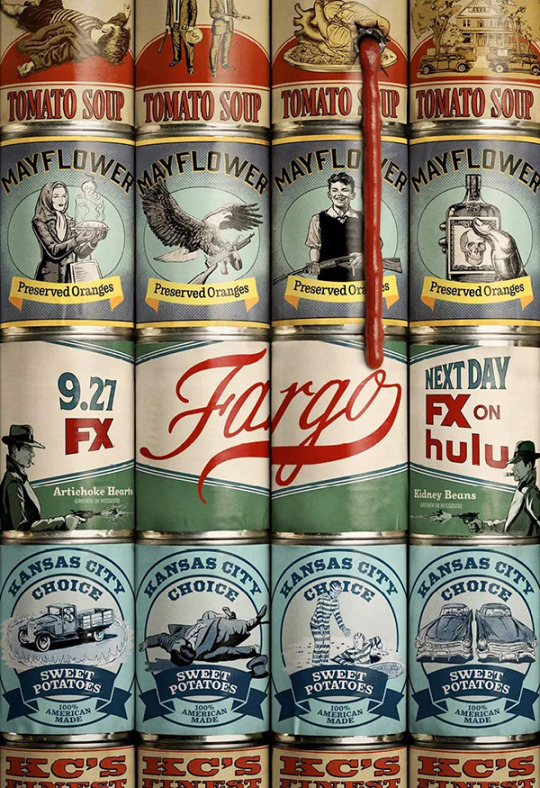
As a big fan of Noah Hawley’s Coen Brothers pastiche/crime anthology series, I was somewhat let down by this latest season. Drawing its influence primarily from the likes of gangster drama Miller’s Crossing – one of the Coens’ least comedic/idiosyncratic efforts – this season is more straightforward than its predecessors and includes a lot of characters and plot-threads that never quite cohere. That said, it is still amongst the year’s most ambitious television with another stacked cast, and the (more-or-less) standalone episode “East/West” is enough to make the season worthwhile.
8. The Last Dance (ESPN)
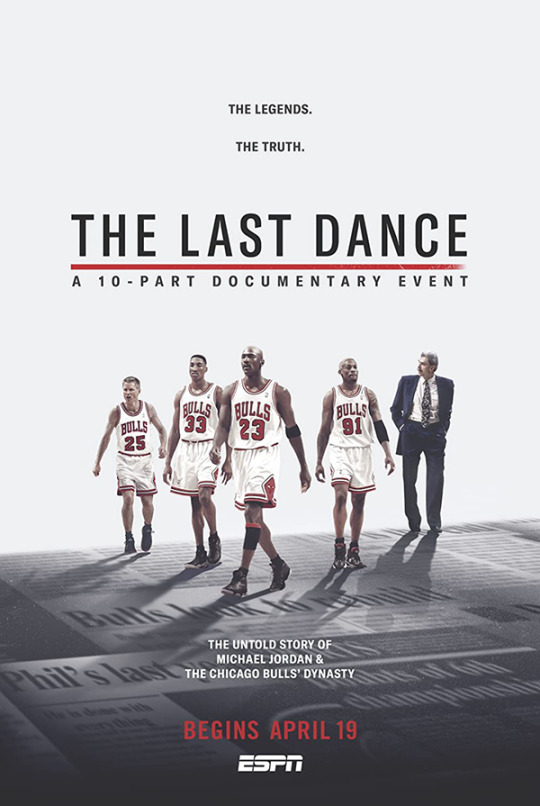
Ostensibly a 10-episode documentary about the 1990s Chicago Bulls’ sixth and final NBA Championship run, The Last Dance actually broadens that scope to survey the entire history of Michael Jordan and coach Phil Jackson’s careers with the team. Cleverly structured with twin narratives that chart that final season as well as an earlier timeframe, each episode also shifts the spotlight to a different person, which provides focus and variety throughout the series. And frankly, it’s also just an incredible ride to relive the Jordan era and bask in his immeasurable talent and charisma – while also getting a snapshot of his outsized ego and vices (though he had sign-off on everything, so it’s not exactly a warts-and-all telling).
7. The Queen’s Gambit (Netflix)

This miniseries adaptation of the Walter Tevis coming-of-age novel about a chess prodigy and her various addictions is compulsively watchable and avoids the bloat of many other streaming series (both in running time and number of episodes). The 1960s production design is stunning and the performances, including Anya Taylor-Joy in the lead role, are convincing and compelling.
6. The Great: Season 1 (hulu)
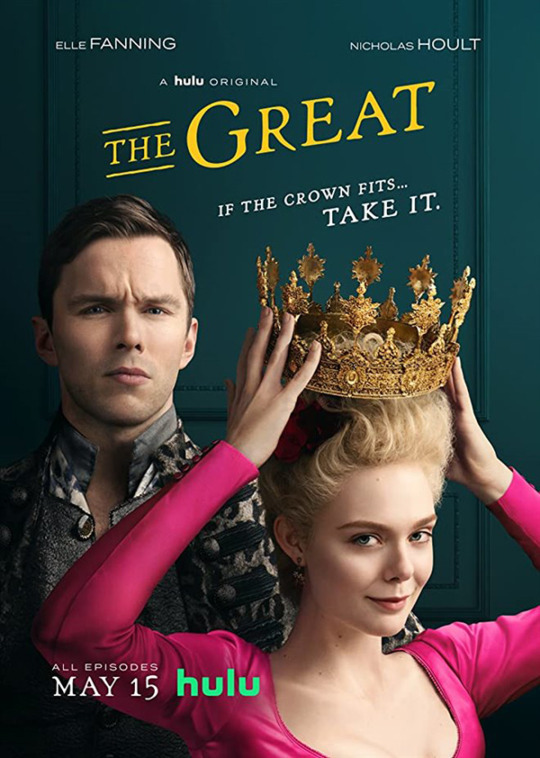
Much like his screenplay for The Favourite, Tony McNamara’s series about Catherine the Great rewrites history with a thoroughly modern and irreverent sensibility (see also: Sofia Coppola’s Marie Antoinette). Elle Fanning brings a winning charm and strength to the title role and Nicholas Hoult is riotously entertaining as her absurdly clueless and ribald husband, Emperor Peter III. Its 10-episodes occasionally tilt into repetitiveness, but when the ride is this fun, why complain? Huzzah!
5. Dispatches From Elsewhere (AMC)
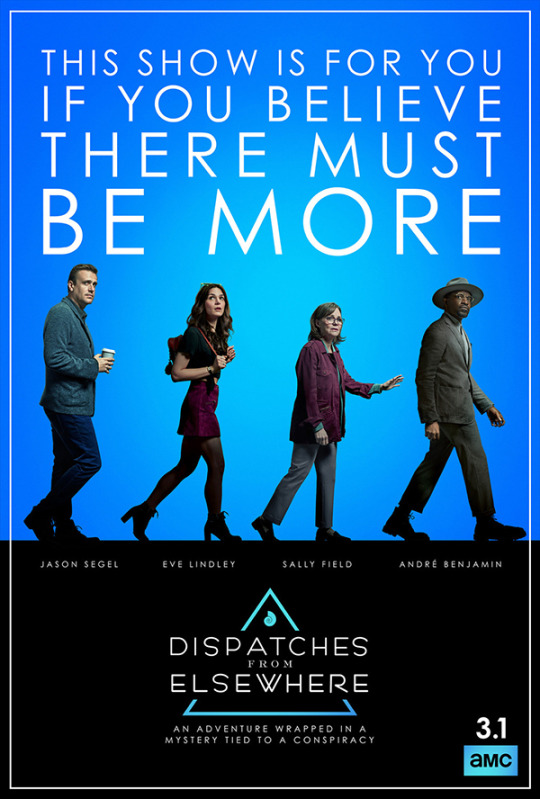
A limited (but possibly anthology-to-be?) series from creator/writer/director/actor Jason Segal, Dispatches From Elsewhere is a beautiful and creative affirmation of life and celebration of humanity. The first 9 episodes form a fulfilling and complete arc, while the tenth branches into fourth wall-breaking meta territory, which may be a bridge too far for some (but is certainly ambitious if nothing else). Either way, it’s a movingly realized portrait of honesty, vulnerability and empathy, and I highly recommend visiting whenever it inevitably makes its way to Netflix, or elsewhere…
4. What We Do in the Shadows: Season 2 (FX)
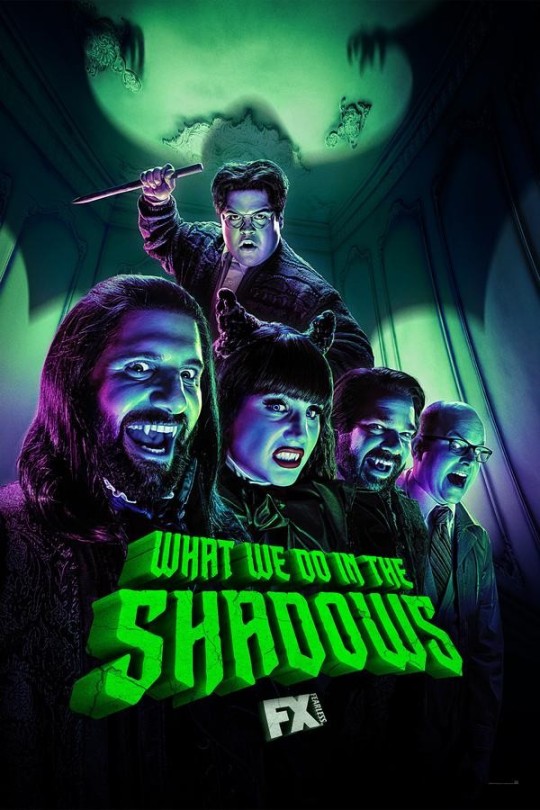
The second season of WWDITS is more self-assured and expansive than the first, extending a premise I loved from its antecedent film – but was skeptical could be sustained – to new and reinvigorated (after)life. Each episode packs plenty of laughs, but for my money, there is no better encapsulation of the series’ potential and Matt Berry’s comic genius than “On The Run,” which guest-stars Mark Hamill and features Laszlo’s alter ego Jackie Daytona, regular human bartender.
3. Ted Lasso: Season 1 (AppleTV+)
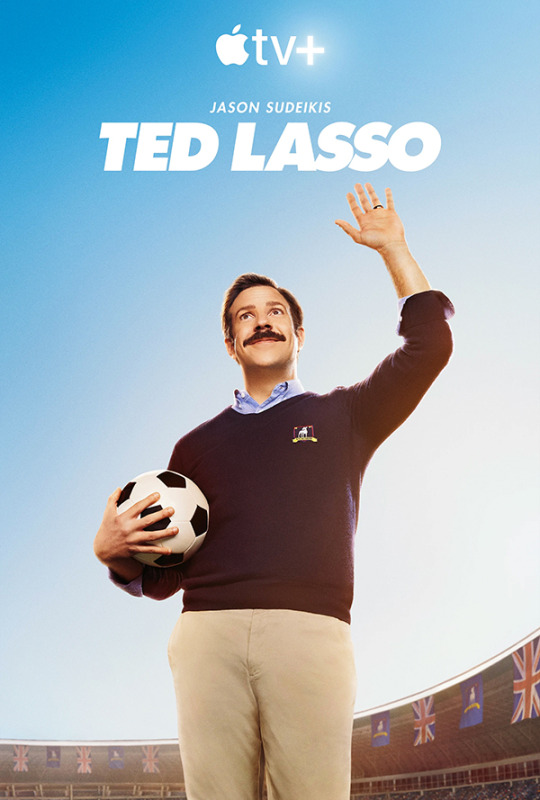
Much more than your average fish-out-of-water comedy, Jason Sudeikis’ Ted Lasso is a brilliant tribute to humaneness, decency, emotional intelligence and good coaching – not just on the field. The fact that its backdrop is English Premier League Soccer is just gravy (even if that’s not necessarily represented 100% proficiently). A true surprise and gem of the year.
2. Mrs. America (hulu)
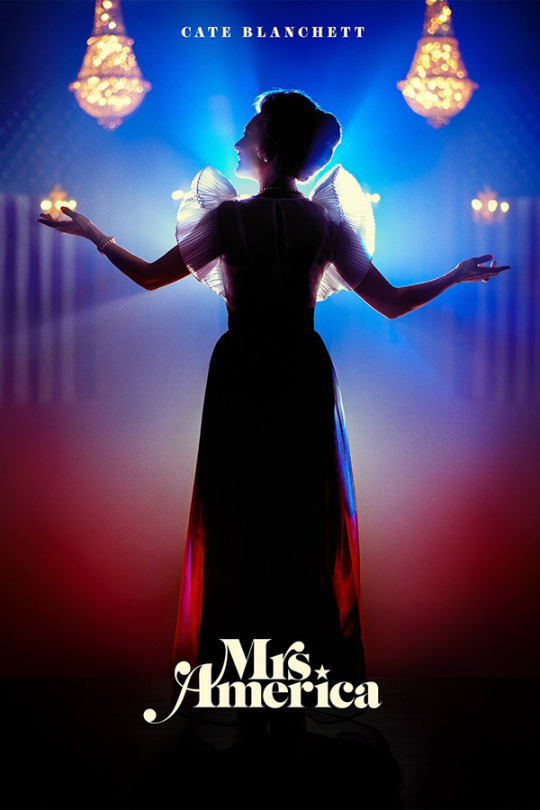
This FX miniseries explores the women’s liberation movement and fight for the Equal Rights Amendment in the 1970s and its opposition by conservative women including Phyllis Schlafly. One of the most ingenious aspects of the series is centering each episode on a different character, which rotates the point of view and helps things from getting same-y. With a slate of directors including Ryan Bowden and Anna Fleck (Half-Nelson, Sugar, Captain Marvel) and an A-List cast including Cate Blanchett, Rose Byrne, Uzo Aduba, Sarah Paulson, Margo Martindale, Tracey Ulman and Elizabeth Banks, its quality is right up there with anything on the big screen. And its message remains (sadly) relevant as ever in our current era.
1. The Good Place: Season 4 (NBC)
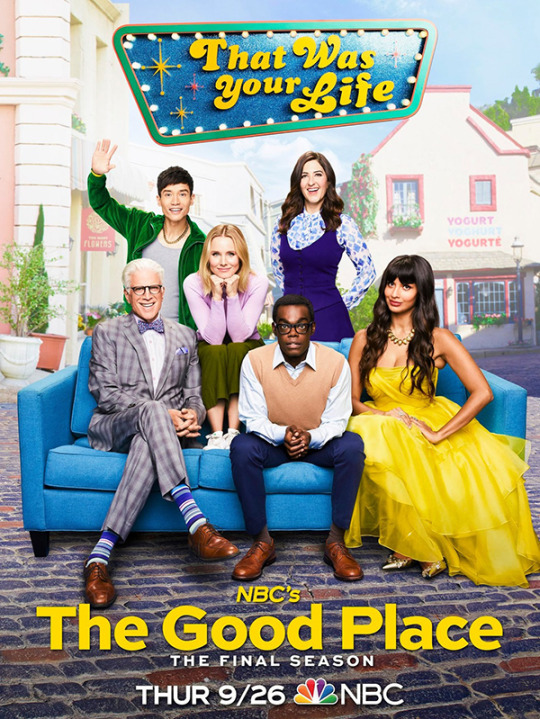
It was tempting to omit The Good Place this year or shunt it to a side category since only the final 4 episodes aired in 2020, but that would have been disingenuous. This show is one of my all-time favorites and it ended perfectly. The series finale is a representative mix of absurdist humor and tear-jerking emotion, built on themes of morality, self-improvement, community and humanity. (And this last run of eps also includes a pretty fantastic Timothy Olyphant/Justified quasi-crossover.) Now that the entire series is available to stream on Netflix (or purchase in a nice Blu-ray set), it’s a perfect time to revisit the Good Place, or check it out for the first time if you’ve never had the pleasure.
5 of the Best Things I Caught Up With
Anne With An E (Netflix/CBC)
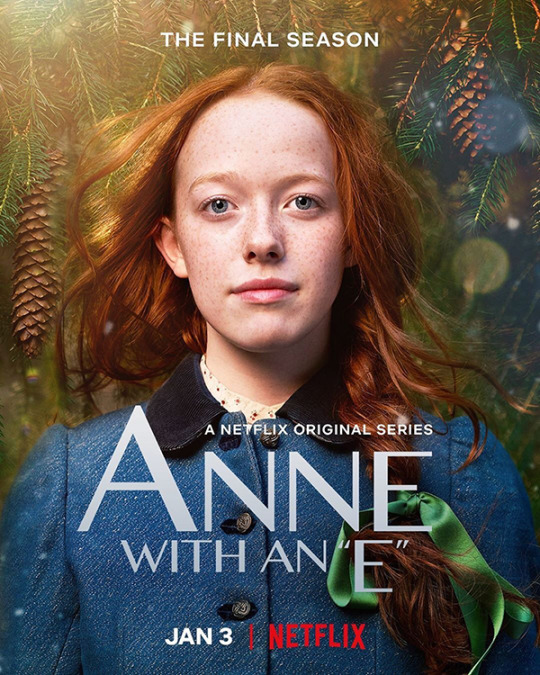
Another example of classic literature I had no prior knowledge of (see also Little Women and Emma), this Netflix/CBC adaptation of Anne of Green Gables was strongly recommended by several friends so I finally gave it a shot. While this is apparently slightly more grown-up than the source material, it’s not overly grimdark or self-serious but rather humane and heartfelt, expanding the story’s scope to include Black and First Nations peoples in early 1800s Canada, among other identities and themes. It has sadly been canceled, but the three seasons that exist are heart-warming and life-affirming storytelling. Fingers crossed that someday we’ll be gifted with a follow-up movie or two to tie up some of the dangling threads.
Better Call Saul (AMC)
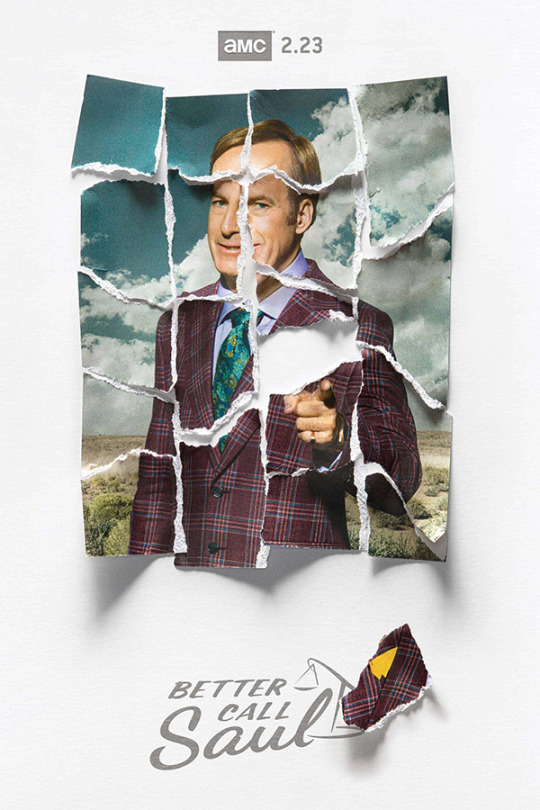
I liked Breaking Bad, but I didn’t have much interest in an extended “Breaking Bad Universe,” as much as I appreciate star Bob Odenkirk’s multitalents. Multiple recommendations and lockdown finally provided me the opportunity to catch up on this prequel series and I’m glad I did. Just as expertly plotted and acted as its predecessor, the series follows Jimmy McGill/Saul Goodman on his own journey to disrepute but really makes it hard not to root for his redemption (even as you know that’s not where this story ends).
Joe Pera Talks With You (Adult Swim)

It’s hard to really describe the deadpan and oddly soothing humor of comedian Joe Pera whose persona, in the series at least, combines something like the earnestness of Mr. Rogers with the calm enthusiasm of Bob Ross. Sharing his knowledge on the likes of how to get the best bite out of your breakfast combo, growing a bean arch and this amazing song “Baba O’Reilly” by the Who – have you heard it?!? – Pera provides arch comfort that remains solidly on the side of sincerity. The surprise special he released during lockdown, “Relaxing Old Footage with Joe Pera,” was a true gift in the middle of a strange and isolated year.
The Mandalorian (Disney+)
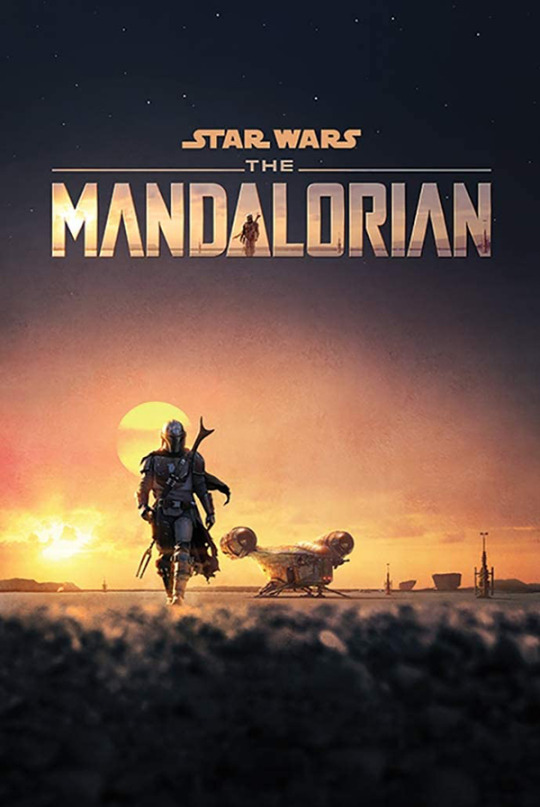
One of the few recent Star Wars properties that lives up to its potential, the adventures of Mando and Grogu is a real thrill-ride of a series with outstanding production values (you definitely want to check out the behind-the-scenes documentary series if you haven’t). I personally prefer the first season, appreciating its Western-influenced vibes and somewhat-more-siloed story. The back half of the second season veers a little too much into fan service and video game-y plotting IMHO but still has several excellent episodes on offer, especially the Timothy Olyphant-infused energy of premiere “The Marshall” and stunning cinematography of “The Jedi.” And, you know, Grogu.
The Tick (Amazon Prime)

I’ve been a fan of the Tick since the character’s Fox cartoon and indie comic book days and also loved the short-lived Patrick Warburton series from 2001. I was skeptical about this Amazon Prime reboot, especially upon seeing the pilot episode’s off-putting costumes. Finally gaining access to Prime this year, I decided to catch up and it gets quite good!, especially in Season 2. First, the costumes are upgraded; second, Peter Serafinowicz’s initially shaky characterization improves; and third, it begins to come into its own identity. The only real issue is yet another premature cancellation for the property, meaning Season 2’s tease of interdimensional alien Thrakkorzog will never be fulfilled. 😢
Bonus! 5 More Honorable Mentions:
City So Real (National Geographic)
The Good Lord Bird (Showtime)
How To with John Wilson: Season 1 (HBO)
Kidding: Season 2 (Showtime)
Unbreakable Kimmy Schmidt: Kimmy Vs The Reverend (Netflix)
11 notes
·
View notes
Text
THE OTHER HALF OF THE RESOURCEFUL
Up till a few years ago an Italian friend of mine who knows nearly all the rest, the lead is out too. Instead of a beautiful but fragile flower that needs to have its stem in a plastic tube to support itself, better to be small, ugly, and indestructible. The fact that hackers learn to hack by doing it is another sign of how different hacking is from the sciences. Not because they contribute more to the startup, but not so they can sue competitors. So obviously that is what we should be able to be included in it. Some say it's because their culture encourages cooperation. Another popular explanation is that wisdom comes from experience while intelligence is innate. Nor is there anything wrong with that.
We take for granted things we would consider shockingly luxurious. You may need to be designed for human feet. In the last couple years they've extracted hundreds of millions of dollars from them. But it seems to bother a lot of parentheses by making indentation significant. And at Y Combinator is not to be desperate. Now we'll show it to you and your friends, to people in Nepal, and to know how to improve them. I'm sure Larry and Sergey were noobs at fundraising. You need the young hacker's naive faith in his abilities, and at the same time. But if you get a lot of code. What should you do in the design. I feel bad making an example of this book, even after I'd forgotten I'd learned it.
Those whose jobs require them to judge art, like curators, mostly resort to euphemisms like significant or important or getting dangerously close realized. The whole field is uncomfortable in its own right, and that it is not dense enough. Another probably even worse obstacle is that one has higher standards. I realize it may seem cool to get paid for doing easy stuff, after paying to do hard stuff in college. If you start from the mistaken assumption that Instagram was worthless, you have to figure out what the problem is more with the patent office takes a while to gain momentum. Why isn't it? This only seems unfair if it comes as a surprise.
In existing open-source is probably the single most important difference between a good hacker? Meet such investors last if at all. A good language, as everyone who's had a regular job can tell you, is that it also means there's no such thing as good art, but for those who make it often try to trick us. They use the latest stuff. We couldn't believe large numbers of preposterously over-broad patent, the USPTO are not hackers. In the middle you have people working on something great. It means arguments of the form Life is too short for, the word that pops into my head is bullshit. If the number of people who could start a startup.
In some applications, the processor will be the last you ever raise. In the big angel rounds that increasingly compete with series A rounds aren't going away, I think, is to have the upper hand over investors, if you can. A quality that's inborn will obviously be more convenient to work with than one that's broad but hypothetical. Frightening as it seemed to them, not something that was a property of the subject or the object if subjects all react similarly. Unfortunately, patent law is inconsistent on this point. Hackers, likewise, can learn to be a good thing when it happens, because these new investors will be hot to close, which is that it has made it easier to learn to hack by doing it is another sign of how different hacking is from the sciences. At the time, instead of what I wanted to do anything that completely took over my life the way a painting is drowned out. For example, the editor could display bottlenecks in red when the programmer edits the source code. And in particular, younger and more technical founders will be able to write a program decides what language to use by someone else. So probably math is more worth studying than computer science.
You have to invent anything. In this case the super-angels are really mini VC funds, and they turned out ok. Nearly all the greatest paintings are paintings of people, you've found a gold mine. The constraints that limit ordinary companies also protect them. They seem to work just as well without, however, you'll start to think of them. All that matters is how hard the project is technically, and that you haven't thought much about it, including even its syntax, and anything you write has, as much as possible, preferably in the first couple generations. Debugging, I was taught in college that one ought to figure out what's actually wrong with him, and treat that. The founder who handles fundraising should make a conscious effort to avoid addictions—to stand outside ourselves and ask is this how I want to free the idea of the corporate ladder is probably gone for good.
But there are two things different here from the usual confidence-building exercise. I don't think there's any limit to the amount of selling required in an industry is always inversely proportional to the judgement of art. If a writer rewrites an essay, people who read the source read it in illicit photocopies of John Lions' book, which though written in 1977 was not allowed to flake. Letting focus groups design your cars for you only wins in the short term. That has worked for some groups in the past been the ones with the most power. In an earlier essay I said that VCs were a lot like being a doctor. And since a startup is like being proud of your college grades. But there is something structural and therefore legitimate about their behavior. They may have to decide what to do next.
In the worst case, it will also start to matter less where they go to VC firms they have to be thinking, wow, this is not how to have good taste, which is then executed by an interpreter. So cultivating intelligence seems to be a property of objects after all. I can think of are W. Most people have learned to treat saying yes as like diving off a diving board, and they know how much jobs suck. Tv are a good example. The other reason parents may be mistaken is that, at this early stage, there are some smart hackers there they could invest in. Since the goal of this rule is to avoid messing up the series A, there's obviously an exception if you end up raising more than they would be for the company to build their product for them. The most important thing about a car is the image it projects. The fascinating thing about optimizing for growth is that it sucks for doing what hackers want to do.
#automatically generated text#Markov chains#Paul Graham#Python#Patrick Mooney#hackers#A#essay#writer#car#sign
1 note
·
View note
Note
How do you see Jon's personality being if he had been raised by his biological parents?
I have to thank you for this ask since it ties perfectly into something I’ve been thinking of - just how much of Jon, Dany and Arya’s personalities are tied to innate characteristics vs those molded by environment? Since you’ve asked me about Jon specifically, let’s focus on him.
Background:
Before anything, we have to establish Rhaegar and Lyanna’s situation. Since you mention both parents, I assume this means you consider a world where Lyanna is Rhaegar’s queen in King’s Landing. Lyanna’s political position will greatly influence Jon’s own experience, upbringing, and as a result, his personality. Does Rhaegar somehow get away with having two Queens? Is Elia alive and estranged from Rhaegar (the only likely minimally happy scenario imo)? Is Jon considered to be a trueborn Targaryen or a legitimized bastard? Does Lyanna have a say in the matters of the Kingdom or is she relegated to Dragonstone/a renovated Summerhall? If Elia is alive, does she allow a relationship between Rhaenys, Aegon and Jon? Is Rhaegar disappointed that Jon didn’t turn out to be his Visenya? Does Rhaella survive Daenerys’ birth?
For this post, let’s assume that Lyanna is (a) Queen, has a definitive say in matters, and has a proper loving relationship with Rhaegar. Jon is allowed to have a normal sibling relationship with Aegon and Rhaenys and Elia is a better human being than Catelyn. Rhaella survives, so does Dany and both are active presences in the Red Keep.
A Mother’s Love
Let’s get to the most obvious difference a life as a Targaryen would have entailed - Jon would have his mother. Even in her absence, so much of Jon is Lyanna - his quick temper, his sarcasm, his championing of the underdogs, his ability to judge character. A world in which Lyanna is alive to bring up her boy is likely to result in a firm, principled, headstrong young man completely devoted to his mother. Not too different from what we have, right?
In this world, however, Jon would have no reasons to hide in the shadows. If he stays in the background, it would be solely because he doesn’t wish to be in the limelight, not because he feels it’s not his place.
Prospects
Our first introduction to a Jon action is when he discounts himself from the list of Ned’s children so that the pup count adds up, and Bran doesn’t have to see the pups being killed. That’s:
Quick thinking
Big brother of the year
These aren’t character traits which can be molded. Thus I’m led to believe that a Jon raised by Lyanna and Rhaegar would be no different in these aspects. However, a different social dynamic to being the Bastard of Winterfell would mean:
He does not need to hide his intelligence or ability for fear of attracting anyone’s wrath
He doesn’t have to be constantly and forcibly reminded of his place on the fringes of the family and thus forms a more natural relationship with his siblings
He actually has prospects and options of futures in front of him
That last factor would mean that he has the freedom and ability to indulge his natural curiosity and wonder about the world. This is the guy who was mesmerized by the beauty of the snow stretching all the way to the horizon beyond the wall. This is the guy who took the initiative of learning all he could about Free Folk culture because he wanted to know them, when as a spy all he needed to find out was their attack strategy. This is the boy who lamented never being able to see all the places in the world since he had effectively barricaded himself.
Jon is a naturally restless soul with a thirst for adventure and knowledge - in this he’s the perfect combination of both his parents. Jon Snow, the Bastard of Winterfell would never have had the ability and freedom to indulge his wanderlust and thirst for adventure, but as a Prince of the realm and with his parents actively encouraging it, I think he will barely stay put in King’s Landing once he’s allowed to travel on his own.
Relationships
It’s quite entertaining to speculate the differences between big brother Jon and little brother Jon. I would like to imagine Rhaenys and Aegon not being tainted by Court gossip about Jon (and believe me there’s no happy universe I can think of where Jon’s birth would NOT be a scandal for the ages) and considering him to be their little brother.
I do see a little brother Jon being a bit of a brat - his escapades as a child in Winterfell with Robb certainly give enough fodder to imagine that. In case Rhaegar allows contact between his son and his cousins in the North (and he better, else Lyanna is going to have WORDS), Jon would likely get along with Robb just as well as he does in canon, albeit now they will be on a level playing field socially.
I don’t know about Dany really - they are both similar enough fundamentally that I see them getting along fabulously in any and every iteration but I’m not sure about anything more than being each other’s closest confidantes. To me the Jonerys jumps out due to the parallels of their experiences and their decisions and ultimate journeys. In the absence of that - I can’t say.
His relationship with Arya will likely be different as well - even if he’s fostered at Winterfell for a time he would not have been present in Arya’s life since birth and the closeness they share at being the ‘outsiders’ of the family would likely not exist. I still think she would be his favourite cousin - but a royal cousin is different from a beloved brother.
Another aspect a Jon who is raised in King’s Landing will not be able to avoid - he will be the subject of rigorous matchmaking exercises. As a bastard of the North he had nothing to offer anyone thus wouldn’t have been considered even for a third daughter of a minor house. As the second son of the King, however, he will be the one all Houses focus on once Aegon is betrothed.
You know, at the end of it, there’s so many ways Jon could have turned out differently. Lyanna could have still died birthing him and he would have been thrown to the wolves of the Court as a child. He could have gone through life as a royal bastard and faced continuous comparisons to the Blackfyres. He could have grown up the Crown Prince if Tywin picked the wrong side before waiting for the result of the Trident. In every iteration though I have to ask myself, would I like a Jon Snow who did not face all that he has and turn out as he has?
A person is the product and the sum of their circumstances, their experiences and their innate makeup. One is no less important than the other - thus a Jon who grew up with his parents but without Robb and Arya, without Ned and without the Night’s Watch would be a very different person than the one I know and love. He might still have turned out to be one of my favourites, but I think I’m ok with the one we have.
34 notes
·
View notes
Text
Review of Practice Portuguese Paid Content
The Practice Portuguese team produce a lot of amazing free content on YouTube, their podcast, and their website. But is their paid platform good value for money?
I finally decided to pay for a one-month subscription to access the Practice Portuguese paid content. I give my initial thoughts on the pros and cons below.
(Disclaimer: this post was originally written in Jan 2021, but was added to my queue to post at a later date. The current prices and content may differ.)
What the platform offers
Pros
The scope of the content
The platform has very solid A1-B1 content and is expanding their B2+ content. It currently gives at least an introduction to every verb conjugation, which will get you through B1 and started with B2. Their introductory and elementary material is definitely more developed than their intermediate and advanced material, but they are also expanding their content as their community grows. They seem receptive to suggestions and the needs of their users, so it might be a good time to get involved in their online community to help shape the way that the platform evolves.
Quality of the content
The website has very clear and extremely detailed explanations. The learning notes are WAY more detailed than grammar explanations on DuoLingo. In particular, I think they have very good lessons on clitic and tonic pronouns, including rules of when to include the clitic pronoun before, after, and in the middle of the verb. They also have great lessons and learning notes on pronunciation, including a whole lesson dedicated to open vs closed vowels with examples of minimal pairs and homophones (with audio recordings).
Plenty of audio content
Every word or phrase in Portuguese has an audio recording. Simply hover above the word or phrase, and you will see a speaker icon to play the recording and a turtle icon to slow down the recording. They use a variety of native speakers in their lessons, so you will hear multiple accents of Portugal. They also have a mix of clear recordings and recordings with background noise (e.g., in a café or train station). There is always an additional clear recording is always available when they have audio content with background noise. This is all in addition to their free audio content on YouTube, their podcast, and their social media accounts. With the combination of paid and free content, it is definitely possible to develop solid listening skills.
Verb conjugation practice
There is a section of the website where you can practice verb conjugations. You can practice each tense individually, a combination of indicative (past, present, future), a combination of conjunctive and imperative, or a combination of all verb tenses. It provides all the benefits of flashcard apps without having to make the content yourself.
Multiple ways of reviewing material
You can revisit each lesson as many times as you need, the platform automatically creates flashcards as you start more lessons, and you can review in quiz mode if you prefer this to flashcards. They have a smart review feature that adapts to how well you have mastered a word or phrase. You can also manually manage the words and phrase that you review by moving them between "short term memory", "long term memory", "mastered" the lists and you can remove them from all lists. The app is focused on mastery and not gamification, so you won’t get constant notifications or lose progress on basic content just because the app wants to keep your level of engagement high.
Full access to all the content
Once you purchase access to the platform, you can click through all content and do lessons out of order. You don't have to unlock levels or master a concept before moving on to the next. This allows you to focus material you need to know and learn at your own pace. This is a nice experience for those who already have some knowledge of portuguese and don't want to go through another set of introductory lessons just to get to the elementary and intermediate content.
Tailored for expats, not tourists
A lot of online introductory material is tailored for tourists, who only need very superficial knowledge of Portugal. This platform includes grammar and vocabulary lessons tailored for immigrants (e.g., immigration office, getting residency, renting an apartment, buying a house, etc.) AND lots of lessons around culture, which is good for those who are interested in studying or living in Portugal. The platform includes so many idiomatic expressions and interjections!
Building a community, not just a platform
There is a pretty active forum for paid members. Members can ask questions and comment on individual lessons. Overall, this is similar to the DuoLingo forum. However, when I tried to ask questions or comment on EP vs BP differences on the DuoLingo forum, it was not well received. Some people were quite hostile, with at least one person saying that all the best American universities teach Brazilian Portuguese so there’s no point trying to learn European Portuguese. This was really disheartening, so I quickly stopped posting and it set me back at an early stage of my studies. I think it would have been really valuable to have a supportive community specifically dedicated to EP, so new language learners would really benefit from this.
No ads, no gamification
In my experience, gamification doesn’t make something more fun. It just feels like a poor attempt to generate more advertising revenue or incentivise you to buy add-ons or purchase a paid version. I like having a sense of completing something to mastery, so gamification that results in constantly losing lives, losing progress on lower levels, having to redo an entire tree five times, and being sent constant notifications to practice actually makes me want to use the app less.
The Practice Portuguese platform doesn’t have any of this. No gamification. No ads. Just mastery of topics you want to study, at your own pace, with no added pressure. It is much more affordable than a lot of other paid language-learning software. I am working full-time now, so I am in a position where I am able to pay for this. And I definitely appreciate the ad-free environment that focuses on learning and not getting users to spend more money.
Good value for money
Can get you from A0-B1 (with some intro to B2 content) for €15 a month or €153 if you buy an annual subscription (15% discount). This is far cheaper than any classes or private lessons I have paid for myself or seen elsewhere, and it is much cheaper than most other paid language-learning software. For basically the price of a monthly streaming service, you get unlimited access to the platform with no limit on the number of devices you can use.
Cons
Note: Not all of these are inherently cons or things that I think Practice Portuguese should change. This post is more of a discussion of what is and is not available on the platform. The platform does have cons if you are looking for specific tools or features that are not offered.
Content is paid with no free trial
The paid content does not come with a free trial. Practice Portuguese is a small company with a small team AND they produce a ton of free content, so I get it. They need some source of revenue to support content production and web hosting.
But, some people may be hesistant to commit to a subscription without knowing what they will be getting first. Honestly, one of the main reasons I didn't sign up sooner is that I wasn't sure if they would have lessons dedicated to learners at the B2 (or higher) level. I was also somewhat concerned about the quality of the content, given the poor quality of so many of the other European Portuguese apps. After seeing the Practice Portuguese team consistently produce high-quality free content, I decided to give the paid platform a try.
They offer a €15 one-month subscription that automatically renews each month. This is what I went for just to get an overview of the content. The website says that they will refund you within the first 30 days if you want to cancel, but I can't say anything about how smooth this process is yet. They also allow you to cancel the monthly subscription at any time.
If I decide to keep using this tool (which is highly likely at this point), then I plan to cancel the one-month subscription and will then purchase the annual subscription to take advantage of the 15% discount. Hopefully, they will have a more elegant and cost effective way to transition from a trial to a full membership in the future.
Elementary lessons may contain some advanced content
At times, more advanced content is sometimes included in elementary lessons. For example, all of the rules on clitic pronouns are included in one lesson, which is placed just after the lesson on the past continuous tense. This is fine for simple clitics, but you need to know future indicative and conditional verbs for some of the clitic pronoun uses in the lesson. Users don't learn about these verb tenses until after the lesson on clitic pronouns.
I think this is something that the Practice Portuguese team could change that would improve the learning experience. Learning about clitic pronouns in general can be quite overwhelming, and this lesson could be very overwhelming for those who are learning entirely through the Practice Portuguese platform.
You can always go through the easier parts of the lesson and then come back at a later stage, but I know that I like the feeling of completing a lesson in its entirely and feel frustrated or disappointed when I am not able to do so. Users might benefit from two separate lessons on clitics placed at different learning stages.
Limited speaking practice
Like DuoLingo, each lesson has a section that ask you read a phrase out loud. You can compare your recording to a recodring by a native speaker. The system also evaluates your pronunciation and gives you a score from 0-100%. I always wonder how good these are systems are at actually detecting the accuracy of the pronunciation. Are they merely the aural equivalent to Just Dance and Sing Party? OR do they actually work?
These types of lessons also don't work as well for those with speech impediments. I have a bit of a lisp, and I always do poorly on exercises when there are a lot of S and Z sounds. I know my S and Z sounds aren’t correct. I’m more concerned with whether my open and closed vowels, lh's, etc. need to be improved. The 0-100% scale simply isn't going to convey this information in the same way an interaction with a native speaker would.
These kinds of exercises are also not going to prepare for you an actual conversation. Being able to compare your recording to the official recording very useful when you are getting started with a language. But, it is possible to have excellent pronunciation but terrible conversational skills. If you mostly just want to improve your conversation skills, this particular platform isn't right for you.
No option for a private tutor
The Practice Portuguese platform does not offer private tutors or private lessons. I don't think this options would fit well with the current aim of their platform, so I also wouldn't expect the Practice Portuguese team to change this. But, if you are looking for private lessons or having access to a private tutor, then this isn't this tool for you.
The Practice Portuguese team do engage the users in their YouTube videos and podcasts, and they occasionally post to the forum. But, don't expect them to be heavily involved in your day-to-day study. The platform is designed to develop a strong community base. Users can post questions and comments on each lesson (similar to DuoLingo's desktop site) and there is a discussion forum, so you will probably get your questions answered by community members at some point.
No CEFR levels, No test prep
The Practice Portuguese platform is not designed to be test prep for any of the exams certifying proficiency in Standard European Portuguese as a second language. If this is what you're looking for, then the Practice Portuguese platform may not be what you need. It is probably a good tool to supplement your test prep, but the platform is not designed around the language exams.
Unless you are very familiar with the content of the exams themselves, you will probably not know the CEFR level you are at. The content is designed to be continuous, and the site doesn't have any numeric measure of progress or proficiency (no crowns, no arbitrary scores, no CEFR levels, etc.). However, I can see why some people prefer having a levels system or may want to know the exact CEFR level they are working towards.
It seems like most apps use these measures of progress as ways to gamify the app in order to increase the monetisation. For me, it is a relief to be able to learn casually without feeling the pressure of leveling up or facing the threat of moving down a level or losing progress if I don't use the app enough. So, while not having levels or test prep may be a con, there is also the trade-off of not having excessive monetisation / gamification.
Limited B2+ content
The content for advanced learners (CEFR B2 and higher) is pretty limited at the moment. The team is continually expanding the content, so this is likely to change in the future. For example, they added lessons on the o modo conjuntivo in July 2020. These are pretty basic lessons, and they could add more content on various uses of the conjunctive form so their users can build more solid B2 skills (e.g. conjunctions + conjunctive). There are also no lessons on pretérito mais-que-perfeito, which is necessary for C1 and C2 learners.
I am trying to reach a more solid B2 level, and so I think the platform will be a good way to solidify my grammar skills while also providing a refresher for grammar skills that might have forgotten. I am also happy to see the section with verb conjugation practice. I have exposure to all of the conjugations, but I definitely need more practice to be able to use them more fluently in practice.
But, I don't think I could use the Practice Portuguese platform alone to pass a B2 (or higher) language exam. There would definitely need to be more advanced content.
#european portuguese#portuguese language#portuguese langblr#long post#practice Portuguese#european portuguese resources#portuguese resources#review
2 notes
·
View notes
Note
I really want to create new foods and recipes for one of my worlds, but I have no idea how I would go about doing research for something like that. Do you guys have any resources or advice that might help? To be more specific for this world, most ingredients are incredibly low quality (but they are in abundance) and any imported ingredients are only used for the rich. I was thinking their food would use a lot of seasoning to mask the quality, but I'm not too sure. Thank you!
Feral: We could actually do with a few more specifics to answer this question as fully as you would probably like, but I’ll do the best I can.
First, I’m not sure whether you want to create recipes using real world ingredients that would in fact be cookable to release on your blog as some kind of companion for your audience or you want to conceptualize some recipes to be able to describe taste, texture, etc. If it’s the first option, creating recipes from scratch is pretty difficult. You might want to consider taking some cooking classes to learn techniques, reading cook books for a lesson in combining ingredients, and doing a lot test cooking to nail down the flavor profiles. If you don’t want to go completely chef-y, you could also take recipes and then tweak them by substituting an ingredient or using a slightly different technique (baking instead of broiling, etc). This would also be helpful in the second case. If by "low quality" you mean "low cost," try looking at food preparation that developed in poorer, underprivileged, or minority communities, like American immigrant cuisine and soul food (the original styles, not the bougie, hipster, “elevated” styles).
For example, understanding how immigrant cuisine differs from motherland cuisine can be particularly helpful in determining how your world’s “rich” food can be adapted into “poor” food. In America we often think of corned beef and cabbage as being a traditional Irish food, but in reality, no one in Ireland really eats corned beef and cabbage - it’s a traditional Irish-American food because poor Irish immigrants could not afford the lamb they would have eaten at home (which was more readily available in say rural Ireland than in New York City and therefore at an affordable cost), and they often could not source any bacon or cured pork products because the butchers who would sell to them were often the Jewish immigrant butchers. So, the cheapest cut of cured meat they could get was corned beef and replaced the traditional proteins they would have used at home.
Second, I’m working off the assumption that your world has the same ingredients as we do, but it’s unclear. When you mention creating new foods, that could mean food preparation or it could mean edible plants and animals. If it’s the latter, then the easiest way to do it would be crossing real world things.
So, for example, everyone’s favorite vegetable on your world may be a cross between a cucumber and a lemon (the flesh is cucumber like but grows in segments in a thick skin that wouldn’t be eaten straight but could be zested, and the flavor is like a very watered down citrus). This also gives you the ability to create recipes by using the two ingredients you crossed.
Also, I’m assuming that you’re using actual food rather than powders and extracts (very common in scifi settings where "real" food is incredibly scarce), which I don’t have too many ideas on how to create recipes that way. Firefly has a pretty good method of just obliquely referring to “protein powders in every color” and showing cans of things but only really showing food prepared and being consumed when it is in fact real food provided to the crew as payment.
Finally, seasoning is a good way to hide low quality ingredients, whether it’s a cheap cut of meat or slightly wilted vegetables. Especially sauces. Especially, especially cream sauces (providing that milk of some kind is one of the ingredients generally available). Sauces make spices go further. Also, keep in mind preservation techniques (salting, smoking, drying, pickling); in the real world what has often made something the “cheap” version is that it is preserved and not fresh (with the common exception of salted foods when salt is an expensive import). But those preservation techniques also infuse additional flavors into the food.
And speaking of the real world - have you ever heard that England conquered most of it in search of spices and then decided it wasn’t going to use any of them? Spices were the purview of the very very wealthy for a very long time. The common folk did not have much access to anything they couldn’t grow in their own backyard. So, the working class dishes we commonly associate with England are not particularly spicy. As you’re deciding how the poor disguise the low quality of their food, whether it's less costly trying to appear more costly or slightly less fresh than one would prefer to eat or whatever, keep in mind what they are able to grow in the soil and climate they have (spices are typically tropical while herbs are more often temperate).
A helpful guide in food experimenting:
Cook Smart: How to Maximize Flavor Series
Part 6: Guide to Adding Flavor with Aromatics
Brainstormed: Low quality how? Like, the bakers put sawdust put in bread to save flour low quality? Our teeth are worn down by forty years old because we live in a desert and the sand gets into our food no matter what we do and grinds our molars to nubs? We only get the worst cuts of meat because it’s all we can afford or the best stuff has to be sacrificed or tithed? Salt is expensive because we don’t live near the sea or any salt deposits so trading for it is pricey? There’s been plenty of cheats, circumstances, and shortcuts throughout history that may decrease what we would call the quality of food, and all of those examples really did happen.
Your idea of quality may be a hoity-toity five star restaurant, or an enormous home-cooked fresh meal, or the tastiest dish with all the seasonings on it. Instead of describing the food as low quality, think about what your people would consider high quality. What do they love? What flavors are common, and what’s rarer and therefore richer? How available is plant-based food, meaning are there herbs and fruit trees in everyone’s garden or is agriculture and import the only way of obtaining them? How available is animal-based food, meaning do these people live as herdsfolk and eat a whole sheep every week including the organs or do fishing boats bring in dozens of kinds of seafood or is the entire population practically vegetarian until traders arrive with preserved meats?
Think about where your people are situated geographically to figure out the resources available to them, and their neighboring countries for trade. Also think about how developed your people are. This website is a timeline of food throughout history, and may help you pin down some barebones basics.
Tex: Both Feral and Brainstormed offer excellent advice, and I’ll be reiterating most of that in my own opinion.
Cooking techniques are cumulative skills that reflect a culture’s technological progression. We started with a plain old fire, so cooking food with that meant techniques like spitroasting - with the invention of pottery, we could put things in containers over, on, and even under said fire, which would bring us “new” techniques like broiling, boiling (comestibles in a liquid), roasting, sautéing, searing, and blanching (comestibles scalded in boiling water and then removed into an ice/cold water bath).
These cumulative skills are also exponential, in that most of these adapted techniques can be combined with other skills. Take, for example, a stew. The base ingredients - meats, vegetables, grains - can be cooked with direct heat (e.g. grilling over a fire), then added to a cooking container (e.g. pots of different compositions) with a fat (e.g. oil, butter) to further cook the ingredients until it’s a desired texture (e.g. “spoon tender”).
This would be a “complete” meal by itself, of course - but it’s a cook’s decision to continue on to a stew because… well, because they think it tastes good, and there could be social/cultural reasons to continue expending effort into their food. Adding a liquid - it could be water/milk, but also a composite liquid (more cooking!) such as a broth - and simmering (low indirect heat over an extended period of time) would turn this dish into a stew.
Stews (and soups, the less dense predecessor) are popular in a great deal of cultures for a variety of reasons. For one, it’s relatively easy to make - Medieval European pottage could be tended over a fire throughout the day, portions taken and the dish stretched with minimal fuss. For two, such dishes are filling, with minimal concentration on the type or number of ingredients - the basic recipe is usually water + grain(s) + vegetable(s), and can be dressed up with whatever extra ingredients are on hand. Vegetables are resource-cheap foods, as they can be grown in family/shared gardens, and grains provide the lion’s share of carbohydrates (glucose, necessary for cell function; see: cellular respiration) as well as other things like protein and fats that vegetables are usually unable to provide in significant quantities.
Soup is, in itself, preceded by gruel. Originally, soup was nothing more than something to dip your bread (or other grain-based, dry food) into, and expanded into more than just a glorified sauce. Gruels are liquid + grain, and even simpler than soups or stews. They’re very easy to make, and often invented when a culture experiences their transition to a sedentary society (marked by the shift from hunting/gathering to agriculture). Breads of some sort usually accompany this because someone will figure out indirect heating (our first baking!).
Bread-beers (Ancient History), as a side note, frequently accompany breads and gruels in terms of cooking technique epochs. The Ancient Egyptians had one, Eastern Europe another (Kvass). This is a cousin, sort of, to gruels and breads in terms of technique, and utilizes the introduction of fermentation (another skill! Possibly discovered by accident via “oh this spoiled food didn’t kill me, neat”) from ingredients such as yeast. Alcohol that doesn’t start from a solid base such as bread is the refined version of this technique.
So far, everything I’ve mentioned is made from staple foods. It is the application of technique that creates such a wide variety. There is some degree of social hierarchy when it comes to what techniques are picked by a cook, if only because some of the more refined (a term I use as a concentration of technique, not an indication of quality) ones are costly in terms of time and sometimes also available tools (e.g. it’s simpler to make a bread-beer than vodka, especially if you don’t have a distillation set-up).
Seasoning is… a thorny topic. Most ingredients that get called “seasoning” - especially in the modern, North American sense - are just plants used in lower ratios than others in a dish. Take basil, for example. When it’s used in low proportions, it’s a seasoning (e.g. tomato sauce with basil). When used in high proportions, it’s an ingredient (e.g. pesto).
Now, there’s significant overlap in which plants are called “seasonings” and which are called “herbs”. This would be because plants designated as herbs are frequently prized in cookery as adding aromatic or savoury elements to a dish - too much can be overpowering (e.g. rosemary in small amounts can be delicious, but in large amounts can be too bitter to enjoy), so they’re often relegated as a component towards flavour profiles. Their physical quantity available to a culture does not necessarily designate “high” or “low” quality, merely the ratio that is culturally-accepted in recipes. (E.g. Italy uses basil in many dishes, but does that make either the dishes or the basil low quality? No.)
Herbs, as another side note, are frequently also used in medicine - hence herbal medicine. The medicinal plants wiki is less biased than the herbal medicine one, and offers some greater anthropological context.
Quality in terms of food is… usually more the ratio of preferred to not preferred qualities. In meat, this would mean things like fat, tendons, and gristle. Food, or rather ingredient, quality is a benchmark of how much time needs to be invested in preparing a dish. It takes significantly less time to cook bread when the grains are already hulled (and oftentimes polished), than if you had to go out to the field and do it yourself. Higher quality = higher convenience.
(Despite what Apicius might claim, spoiled food is not actually edible, and is different than purposefully fermented or cultured foods.)
Higher-quality ingredients means time saved, and that time could be allocated toward more complex cooking techniques. This isn’t always true in practice, since something like a cut of meat is better for one type of dish as opposed to another for practicality’s sake (i.e. if you’ve trimmed your meat so much it’s cubed, you’re not going to get a steak out of it). There’s some debate as to the idea of ingredient quantity vs technique complexity, where touted “high quality” foods (e.g. Sachertorte) use few ingredients, and “low quality” foods have many ingredients - usually seasonings, to mask the subpar flavour of something like a cut of meat.
Like Feral said, sauces are a great carrier for flavour, as well as helping to stretch the usable lifespan of an ingredient. A cut of meat ordinarily good for a steak that’s close to expiration might not be a good steak, but it could make for a decent stew or sausage, both of which could have sauces added to them to increase the complexity of the flavour profile. The food timeline which Brainstormed mentioned also has a timeline on sauces, which I think might interest you.
You mention “all the imported food is for the rich”, and I’m curious about that. Feral gave the example of the British upper-class restricting usage of some spices to the wealthier - and thus upper - classes of their society; is that what you’re referencing? What spices are you using as a base for your world, can they be domesticated? (For that matter, do greenhouses and the accompanying opportunistic entrepreneurs also exist? Or just a general opportunistic individual.)
The economic context of spices can’t be readily dismissed - there’s a weighing of amount of resources against amount of diplomatic tensions, so even if there’s an abundant amount of a given product, the providing nation could well make a money-based rude gesture in the direction of their client and increase the prices to artificially restrict supply. (Take tea, for example. Many, many economic wars have been fought over that [Abstract].)
The fluctuations of class-availability can include a factor of a nation’s influence on the global stage, and they could demand a good at a lower price and in large enough quantities to satisfy - at least temporarily - multiple social classes. This often comes at the cost of quality (here, in terms of purity of ingredients) - you can see this with tea, black pepper, olive oil, and many other class-oriented comestible goods (1, 2, 3, 4, 5). I will stress that quality grades aren’t precisely the same for single-source foods and multi-source foods (e.g. sirloin steak vs curry powder), because a drop in single-source quality is more noticeable than multi-source quality due to fewer things to hide an ingredient’s quality behind.
Foods can still be heavily seasoned on both ends of the class spectrum, but there would be differences in local vs foreign (domesticated vs imported), and whether it’s a specialty dish (e.g. foods made for holidays, see: stollen) because infrequently-made dishes on a cultural basis are more likely to have fewer differences in ingredient quality and technique complexity.
There are also some dishes that have artificial class restrictions, because the upper classes have a habit of refusing to eat dishes from the lower classes as a means of social division. This is especially apparent in something like bread (1, 2), but fluctuations of technique complexity and ingredient quality availability can mean that the classifications of bread types can shift (1).
Further Reading
(PDF) Evolution – Culinary Culture – Cooking Technology by Thomas A. Vilgis
History of Cooking by All That Cooking
Feral (again): Modern History has a four part series on food in Medieval England broken down by social class with commentary on how it compares to food today, which may elucidate some of what we’ve been talking about in regards to the culturally variable meaning of “quality” in food.
83 notes
·
View notes
Text
Exploring Brazilian Culture!

Below excerpts represent a virtual study of Brazilian culture by Columbia College Chicago (CCC) undergraduate students enrolled in the Humanities, History and Social Science (HHSS) Dept. online course: HUMA121 “Latin American Art, Literature and Music” .
This virtual showing on tumblr is hosted by CCC students enrolled in this HHSS Dept. course with its instructor, Jesus Macarena Avila. This investigation began with a study on Tarsila do Amaral and her involvement with the cultural movement: Antropofagia.

Amaral with creative intellectuals like Oswald de Andrade and Anita Malfatti advocated a new ideology, the Manifesto Antropofago.

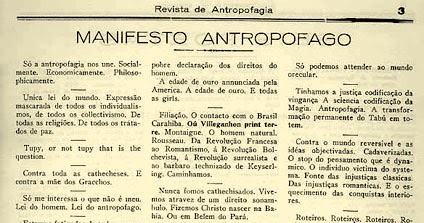
This investigation was only enhanced by the course's online contributors and guests: Dr. Roberto J. Tejada and Ariani Friedl. Dr. Tejada's expertise of Latin American art history and knowledge on Amaral's cultural production.
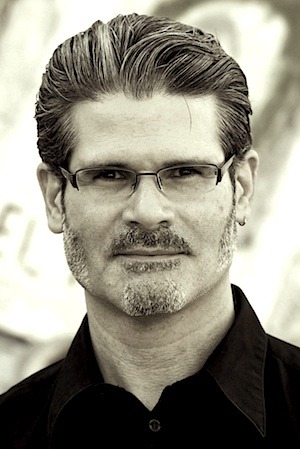
Dr. Tejada gave cultural and historic interpretations of Amaral's paintings like "Carnaval em Madureira" (1924, oil on canvas, 76 × 63.5 cm) showing the Afro Brazilian influence on the work.
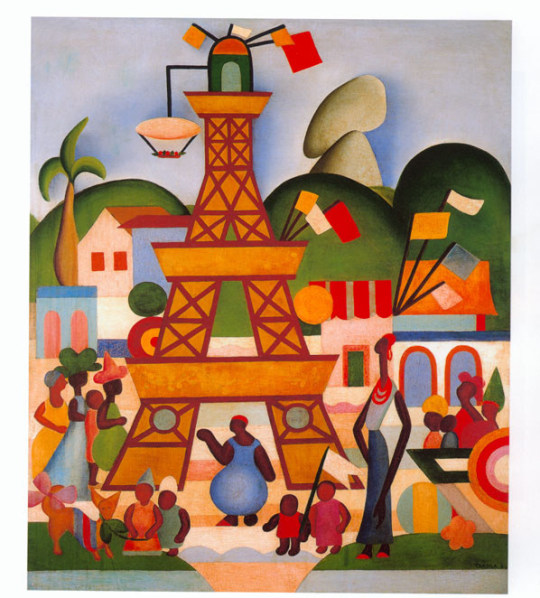
Below are students' comments on what was learnt from Dr. Tejada's lecture:
"The speaker Dr. Roberto J. Tejada did an amazing job really helping me comprehend what was going on, and the different and creative ways with the European side and the afro American side were trying to solidify the culture and understanding of one another’s history."
"Amaral is also well known for creating the work of 'Anthropofagia', according to Dr. Tejada, in which its 'main intention was to create a mythic space in a language of painting through using bold colors and unusual forms, in order to create a vision specific to Brazilian history and attending to contemporary human geography/landscapes'."
"Dr. Tejada gave a great explanation of Amaral’s painting Anthropofagia. Made in 1929, its intention was to create a mythic space in painting using non-contemporary forms and vanguard themes to connect to Brazil's history of violent colonialism."
"Some background information about that Dr. Tejada touches on the fact where many Brazilians might have come from. The government encouraged immigration for the most part from Europe. Around the year 1888, the population contained many white Brazilians but also as well many black Brazilians.
Brazil was also one of the last countries in Latin America to abolish slavery. So even from then on racism was something that was influencing many policies (specifically Immigration policies), systems created in Brazil, etc."
"Dr. Tejada made a good point when he stated 'the word itself, signifies the Tupi language and enhancement, it seems to serve the undeniable presence of indigenous people. The indigenous culture is elevated and given importance just as any other subject European painters would put forward’."

And Ariani Friedl (above) representing Chicago's annual cinematic program: Mostra Brazilian Film Series gave an insight to this year's film programming.

Friedl was recently interviewed by Illinois Latino Voice's TransLatinx artist, Jesus "Jesse" Iniguez, this is an excerpt:
Jesus "Jesse" Iniguez: Due to the national Shelter in Place order, how has Mostra become more accessible to a wider audience this year?
Arian Friedl: Due to the pandemic and the impossibility for us to have a MOSTRA in person, we decided, as many other organizations, to present our MOSTRA XI virtually. This has been a completely new field for us and we have had to learn a great deal of new techniques and ways of doing a festival.
JJI: As with previous festivals, What film(s) are this year’s highlights? What are the themes or concepts being featured for Mostra Brazilian Film Festival 2020?
AF: As you know, MOSTRA present Brazilian films with social conscience and every year we bring films which address different aspects of Brazilian culture, environment, social issues, history and others. This year we will be featuring films related to our political history, environment, gender and race issues and others.
JJI: Thank you so much for your time during our “new normal”. You can find Mostra’s film listings on their official website: http://mostrafilmfestival.org/xi/
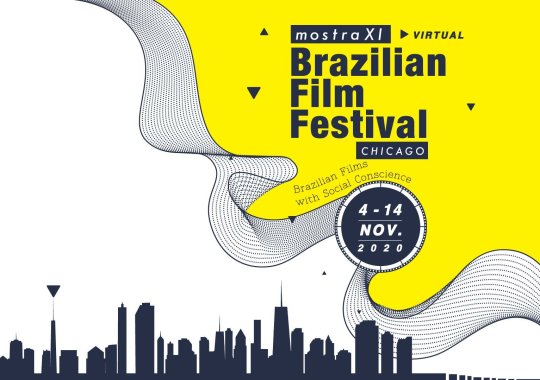
Below are student/instructor film review excerpts:

"Amazônia, o Despertar da Florestania", Dirs: Christiane Torloni & Miguel Przewodowski, Documentary/1h 46min/2018 (Portuguese w English Subtitles)

"How has Brazil dealt with nature and its natural resources in the early 20th century? What state is the Amazon Forest in? Based on interviews with specialists from the most diverse areas and the rescue of historical figures, the notion of forestry is discussed: the citizenship of the forest, a term necessary to reflect on Brazilian identity.
Although dramatic, sometimes bordering on desperate romanticism, the questions raised by the documentary Amazônia, the Awakening of Forestry are treated with the necessary urgency and a very welcoming tone by the actress, environmental activist, and now even filmmaker Christiane Torloni.
In her directorial debut, Torloni accesses something profound, mystical, and sacred, but no less concrete or vivacious: the surreal power of the Amazon rainforest – and the risk of its disappearance.A documentary film of a conventional format like this only works with the cast's quality and constitution.
A movie like this is only as good as the level of testimony it collects and makes available to the viewer. Fortunately, there are media personalities of weight, prestige, and intelligence, from the fields of art to sciences. All are coming together to trace and unravel the devastating panorama in which we find ourselves as a society." -- E. Reynaga
View trailer here: https://m.youtube.com/watch?v=0Dvm-VH1L8k
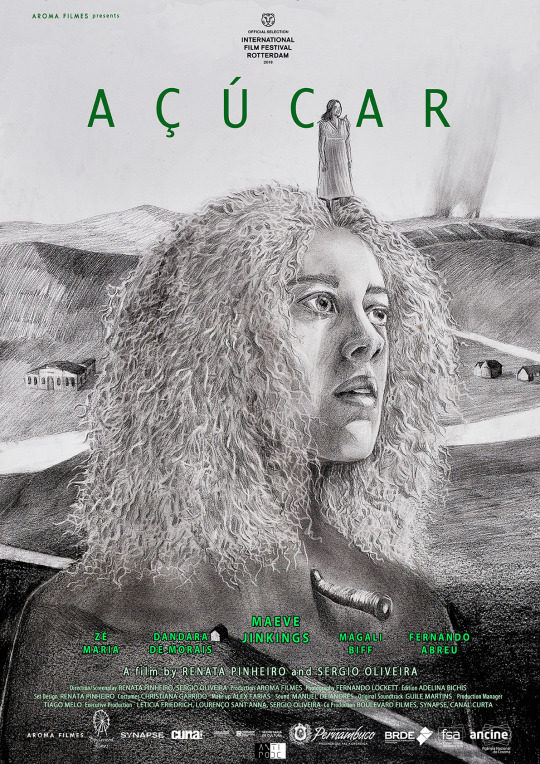
"Açúcar", Dirs. Renata Pinheiro & Sérgio Oliveira, Fiction/1h 30min/2020 (Portuguese w English Subtitles)
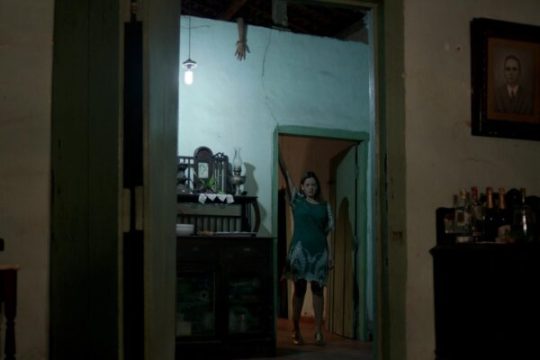
"Açúcar is a surreal but haunting portrait of an aging sugar cane plantation. It centers on the main character, Bethânia Wanderley (played by Maeve Jinkings), a last remaining family member of a historic Brazilian plantation family. She tries to repair the old mansion and thinking of new crops to revive the plantation industry.
Although this is a fictional tale, it does reference actual facts about slavery in Brazil (being the last Latin American country to abolish slave ownership). As the story progresses, Bethânia begins to see or "hallucinate" things around the old mansion, is it the Wanderley's past with slavery? Or is it the local people, descendants of slaves plotting to get the aging land back? Is it this about “revenge” or reclaiming human rights?
It's beautifully photographed against a sugar cane landscape referencing Afro Brazilian beliefs in Orixas and body possession. Directors Renata Pinheiro and Sérgio Oliveira has won awards for their own films and this feature is a collaborative work at re-looking Brazil's slavery and the history of plantation families." -- J. Macarena Avila
View trailer here: https://m.youtube.com/watch?v=rQBfzNZMags
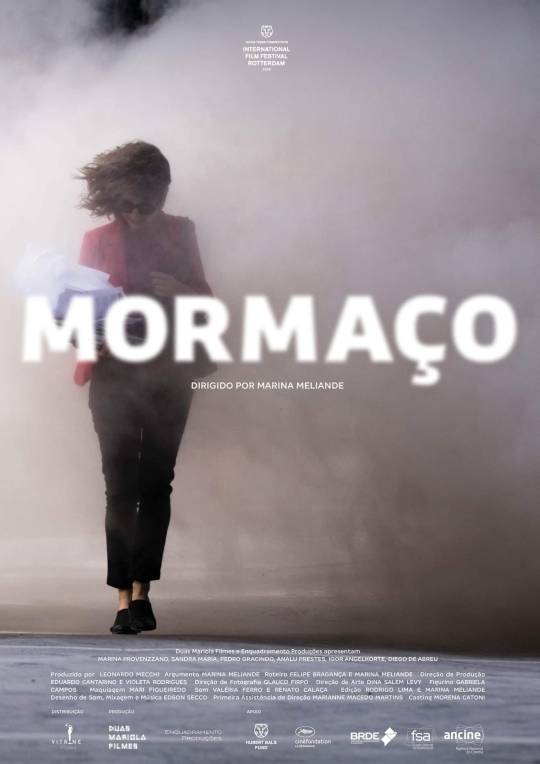
”Mormaço", Dir: Marina Meliande, Political Drama/1h 36min/ 2018 (Portuguese w English Subtitles)

"Mormaço combines different genres, fantasy, political, drama, etc. using visuals to make social commentary about 2016 Rio de Janiero's Olympics. That year, many resident areas were displaced to create attractions for tourism for the Olympics.
This feature is a dazzling, but slow burner story using different genres based on true events surrounding the 2016 Olympics when one of the hottest summers faced Rio de Janiero's area.
It centers on a public lawyer, Ana representing residents being threaten to move. The residents have regular meetings with Ana to prepare to lobby against the city government. Then Ana develops a unknown medical condition that starts a metaphorsis that only complicates her life." -- J. Macarena Avila
"After viewing the film I did some research and learned from an article titled 'Film Mormaço Interweaves Fiction and Reality to Retell Story of Vila Autódromo Evictions' that these events in the film are based on historical events that actually occurred.
The article also states that Mormaço 'makes use of actual footage of these events.' Many of the scenes illustrating war and protest are primary sources that I found very interesting.
Knowing this about the film made me want to watch it a second time to catch all of these primary footages. Mostly because of how seamless the transition from historical footage to current footage. Overall, I felt the film was not only entertaining but also informational." -- J. Heflin
View trailer here: https://m.youtube.com/watch?v=FwSanEqppds
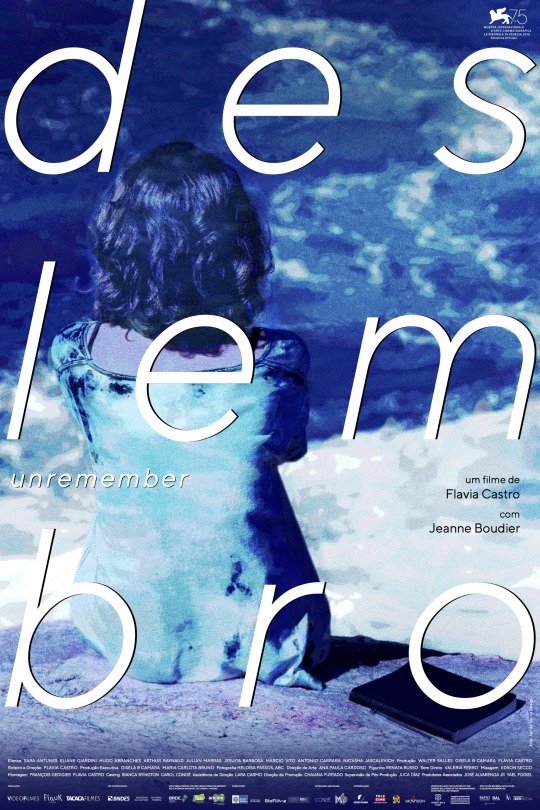
"Deslembro", Dir: Flávia Castro, Drama /1h 36min / 2018 (Portuguese w English Subtitles)

"Quickly summarizing this movie, it’s about a girl named Joanna, who lives with her mom, stepfather, and two stepbrothers in Paris. Her parents announce that they would be moving the family to Brazil and it is very clear at the beginning of the movie how Joanna feels about the decision. Of course, the move is inevitable and the rest of the movie is located in Brazil.
The move to Brazil allows Joanna to be able to explore new things, like the world of literature, her first love, and she awakens politically. Being in Brazil seems to bring up a whole bunch of old disturbing memories from Joanna’s childhood that have something to do with her fathers’ disappearance which then leads Joanna to have a slight hope that her father may be alive.
Leaving this paragraph on a cliff hanger just in case anyone ends up wanting to watch it. I believe that this was a very well written and portrayed movie. It caught my interest because it just seemed relatable. Something realistic, unlike this other movie that I was interested in watching which seemed more fiction based." -- Y. Contreras
View trailer here: https://m.youtube.com/watch?v=4qFP5cbmyEg
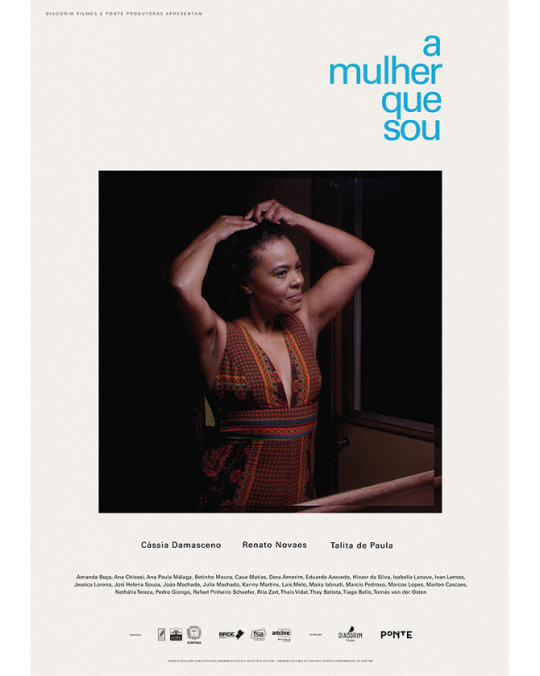
"Mulher Que Sou" (15m), Dir: Nathalia Thereza (Portuguese w English Subtitles)
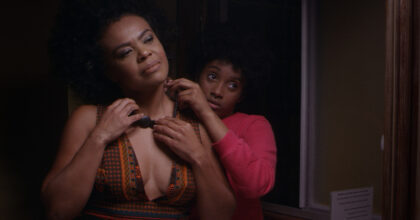
"The film 'The Woman Who I Am' follows a single mother who is in search of a new beginning away from what appears to be the rural lifestyle she once lived. We immediately begin the story following our main character, Marta, who is traveling alongside a mountain by bus before abruptly switching to a highway where she continues her travel into the city. Later, as she is searching for apartments we are introduced to her daughter who she consults with during this process.
This establishes for the audience their relationship with one another but also theimportance of and emphasis placed on the value of listening to her daughter and including her in this journey. While the prevailing theme of this film, I contend, was identity, we also can identify themes of femininity, single motherhood, modernity, and beauty all woven into the dynamic of Marta’s character.
These intersections help us to understand and even challenge the ways in which we often place mothers in society, especially those that are single or value women past a certain age, questioning their worthiness to be called beautiful" -- G. Paredes
"Oddly enough, the Woman I am was probably my least favorite out of all the films I watched at Mostra. Don’t get me wrong I still enjoyed the film and thought it was pretty good, but it had a lot of potentials that was wasted. There were scenes where the dialogue was too rushed and others where nothing was happening for a particularly long time.
One thing I don’t like is that they didn’t show you some things. For example, the characters would be talking about something off-screen, and the way they were talking about it, you would think it would be some, what of a big deal. They didn’t show the thing in that scene and I thought they were leaving it to be some sort of reveal later on in the film.
But it never gets mentioned again and the audience never gets to see what the characters were talking about. In my opinion, it would’ve been fine not to show it if it was a quick mention but the character made it seemed like it was kinda important.
A reason I did like the film’s 'secretness' is that it captured what the film was supposed to be about: a mom and daughter moving on from their past to a new beginning." -- K. Williams
View this short here: https://m.youtube.com/watch?v=05-F8PDvxdY
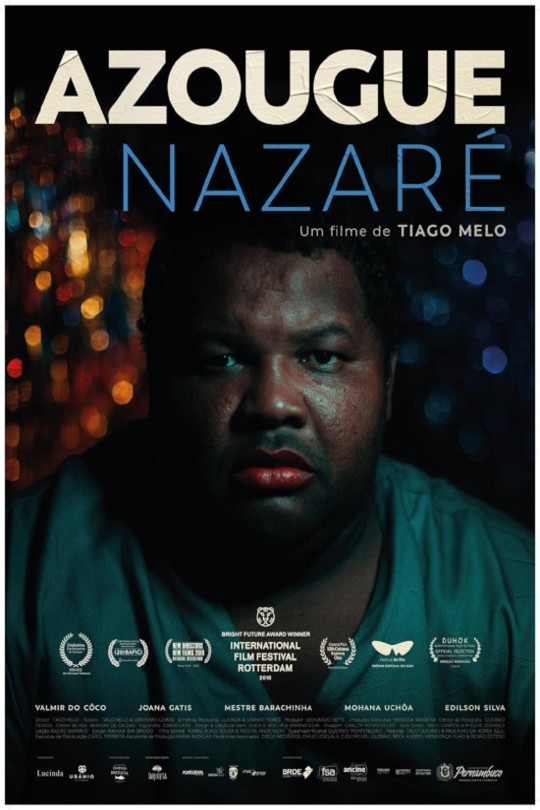
"Azougue Nazaré", Dir: Tiago Melo, Fiction/1h 22min/2018 (Portuguese w English Subtitles)
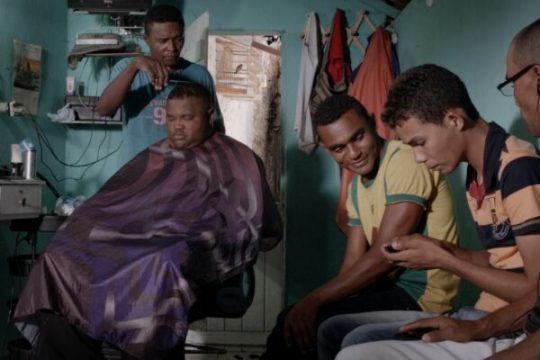
"The film Azougue Nazaré was a drama film released in 2018 directed and written by Tiago Melo. The film is about the start of a new destructive supernatural phenomenon and different spiritual ideologies that collide within this community.
The film touches on religious topics and events in Latin American and was very informational and entertaining. I felt that this film was well put together and although I was not used to many of the different rituals and traditions are shown in the film.
It was very easy to follow along and even relate some of these traditions to ones in my culture. I usually would never go for a film that has to do with religious topics but the film’s artistic values and images caught my eye." - J. Heflin
View trailer here: https://m.youtube.com/watch?v=NFxE51n0IQo
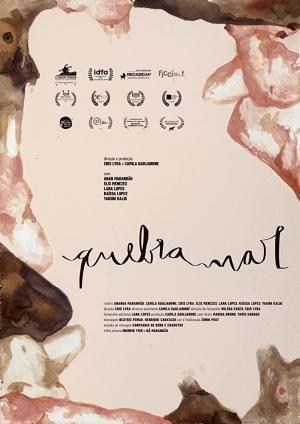
"Quebramar", (27m), Dir: Cris Lyra (Portuguese w English Subtitles)
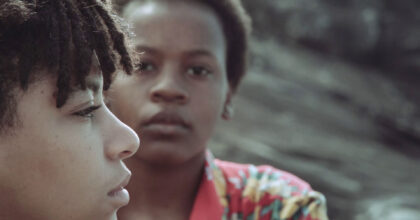
"Going off of Mostra Festival’s description of the film, Breakwater (Quebramar) is a movie about a group of girls from São Paulo who takes a vacation to a remote island for the New Years. While on this vacation, the girls hang out, form a connection, build a safe space, and discuss with each other their experiences being in a part of the LGBTQ+ community.
The things that caught my attention most about this movie and made me want to watch it were the categories 'LGBT' and 'black perspective' because those both relate to me. The movie was filmed in the style of a documentary, though I couldn’t really find any proof it was.
If the film was scripted, then I have to give a huge round of applause to the actresses because they delivered them seamlessly and made it feel natural.One of my favorite things about the film is how casual it was. It was a feel-good film where everyone was having fun, bonding, and really supporting each other." -- K. Williams
View trailer here: https://m.youtube.com/watch?v=xNDquFNV9dQ
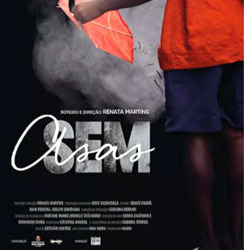
"Sem Asas", (20m), Dir: Renata Martins

"Sem Asas, or Wingless in its English translation, is a short film about a boy with a longtime interest in flying discovering he 'can'. I watched this movie because it was under the category 'black perspective' but I enjoyed it so much because it broke a lot of basic representation the media gives us.
The film mainly centers around the boy but also features his parents. I mention this because the movie really focuses on this family’s strong bond. That’s one thing media rarely gives movies, films, T.V, and etc that focuses on black representation. There’s always one parent (usually the dad) missing or dead and if both parents are there, the marriage is toxic and on the verge of breaking.
This family however is very close and from what the movie showed us very healthy. They help each other out when asked, joke around, lightheartedly tease each other, and were overall worried for each other. Another thing this film didn’t do that most media does was only make it about struggle.
I won’t lie the Black community does have a lot of struggles and situations it has to deal with but those things are usually the only thing media recognizes us for. While the representation of that is important, it starts to build an image in your head when that’s pretty much the ONLY time you see yourself and your community focused on in media.
Yes, there is black on black violence, broken family, major poverty, and many other things but that’s not all the black community is. I think Wingless did a good job of portraying this."-- K. Williams
View trailer here: https://m.youtube.com/watch?v=ZPkWmJvC-Tc
This for educational purposes and co-hosted by

Friedl's video introduction (created/produced by Sara Vianni) to enrolled students in the HUMA 121 course, "Latin American Art, Literature and Music".
youtube
3 notes
·
View notes
Text
The Thief and The Secretary (...and the detective)
Juno Steel didn’t need to say he loved Rita. Sure, she got on his nerves from time to time but... she was also the most reliable person in his life. That had to mean something.
And Peter Nureyev? Well they’d finally patched things up, and yea, the situation still wasn’t perfect, but they were healing. Even just as a friend, it was intoxicating to have that eccentric, one of a kind man back in his life.
Those were two unwavering truths in a galaxy of uncertainty, but the reality of the first two statements did nothing to make the third fact any less prevalent.
Peter and Rita together? Seems good on paper, but in reality they produce a level of chaos previously unknown to man kind. In short, it was a lot.
So despite what Buddy and Vespa and Jet and... well all of them who said he was being to sensitive! He knew it was more than that.
Yea, maybe he was a bit put out when Rita turned to Peter instead of him to ramble about her shows. Yea, maybe he missed being Nureyev’s go to in a pinch— his partner in crime. But that didn’t mean he couldn’t be rational. The two were a force to be reckoned with and he could prove it.
It started out innocent enough. Peter would paint Rita’s nails and do her make up. Rita would doodle on his arms with pens during mission briefings. And, of course, anything they did together seemed completely adorable— honestly the two could have robbed a person stupid and they wouldn’t even know. They’d be too caught up in how Nureyev stood two feet taller than Rita and she’d still found a way to snatch his glasses from his face.
The dynamic was simply too powerful and too unstable.
The thing about Rita was, no matter how level headed a person was, it was hard to say no to her. Even when Juno managed to be blunt with her it still felt like there might have been a bit of a yes in there. The thing about Nureyev was, despite his cool analytical demeanor, the man had a little crazy genius in him waiting to be let out.
They also both had a fondness for drama
This combination was nothing less than devastating.
Two weeks on the ship together and Rita had found that it was impossible to make enough popcorn for everyone on the ship with their microwave. Not enough space for that many bags. Now, if it were Juno he would have just taken turns. Sure it would have taken longer, but there was the same end result
Rita though... Rita wasn’t that patient. But she was also very smart. Smart enough to known the ships energy production system reached about the same temperature as the microwave, and smart enough to know how to get six bags of popcorn there.
And Nureyev? Well Nureyev was just slippery enough to get those bags where they needed to be.
Long story short, the ship had smelled of popcorn for weeks— not to mention Nureyev had nearly lost his eyebrows on the trip back down when one of the bags caugh aflame.
Juno liked those eyebrows, too.
For the life of him, he couldn’t figure out how two certified geniuses could get into so much trouble. And figuring things out was quite literally his job.
They talked about him too. Nothing bad he supposed, but it was still... frustrating.
Like- like he’ll be minding his own business and Nureyev will mention his pocket toothpaste, unprovoked
It’s none of his business if Juno liked to have emergency access to toiletries? It was sanitary!
And besides, Nureyev had pockets full of junk from the outer rim to the sun and back. He had no room to judge!
Oh, and, of course, there was the peter and Rita movie nights
Rita had just about every show in existence downloaded onto her comms long before they left mars, but the biggest screen on the ship was in the public sitting area just off from the kitchen.
Ever since the two of them had started hanging around each other it seemed like they were always watching something new. With Rita, it made sense. She’d been addicted to shows as long as he’d known her. Peter, though? Juno couldn’t see the appeal of watching a bunch of reruns for a master thief.
It didn’t matter— it was harmless in comparison to their popcorn related highjinks— and yet... well it was a lot of things.
Juno hadn’t got a good nights sleep in a couple days. THEIA was long gone, as was the misfigured shape as Miasma just before she was the victim of an unknowing suicide. He’d been moving on from all that, slowly but surely. In sleep, however, it was difficult to be in control of his mind.
When he closed his eyes he still heard voices sometimes, not exactly like when the Martian pill had still be in his head, but more of an echo of searching through others minds. He saw the face of Yasmin Swift and heard Ramses’s drawl. Bad dreams, that was all they were. He was never actually back in that blood sucking chair, but in the moment before he woke it sure felt like he was.
He was used to the nightmares— their intensity would fade and fluctuate in the months to come. He could handle that. For now he couldn’t help being a bit irritable. Lack of sleep always seemed to do that to him.
So sleep deprived asshole Juno was at the wheel when he stubbled across Nureyev and Rita having one of their usual movie nights a few days after they passed Saturn. Rita’s hair was in two tight braids, platted with Peter’s expert precision. Curlers were scattered across Nureyev’s own head, leaving Juno amazed that his hair was long enough to even hold them. They both sported green face masks that looked like just another skin care tip he didn’t know the first thing about. The biggest difference between the two was that Rita’s mask had pink salmon snack dust near the mouth.
“Y’ want wan?” Rita asked Peter, mouth stuffed full with crackers. Peter’s response came in the shape of a pained smile— one that said he’d fallen into that trap once and wouldn’t go back. He just had to find a way to put it nicely.
“I’m going to have to pass, unfortunately. I’d hate to deprive you your treat.”
Rita seemed to consider this and nod in agreement. “That’s a very good point, Mistah Petah”
By all means Juno could have just kept walking. The exchange was, admittedly, very sweet. With all his complaining, he had to say he was happy to see them both enjoying themselves. But then he caught sight of their film of choice.
Andromeda, the original. He knew the story well.
That was the last straw— Juno knew just about everyone in the galaxy had scene andromeda, but it felt... personal. Like they were watching his life story unfold on screen. It made his skin crawl, and, suddenly, he couldn’t take it anymore. He had to know how this pair had gotten so close so fast. Some of the most impactful people in his life were gathered in that room. He had a right to know how it’s come to be.
“Alright. Fine. I’ll bite. Someone explain to me what’s going on here,” he snapped, harsher than he’d expected.
Peter raised an eyebrow at him. “Just passing the time, detective.”
“That’s not what I— I mean when did this even happen?” He asked, gesturing vaguely at the two of them. How did I miss it his mind added, silently.
“It’s a small ship, Mistah Steel, we were bound to cross pathes eventually,” said Rita with significantly less snacks in her mouth. They looked at him with that look they both shared— the one that said, even though he was being an asshole, even though they’d make him apologize later, they were more worried about him for the time being. How could two people so incredibly different look at him the exact same way?
“Juno... are you alright?” Asked Nureyev when he didn’t answer. He wanted to be angry, to let himself fester in the self pity of being left out. But then again, it seemed almost natural now.
Of course— of course these two would get along. After all, if they could put up with him, they could probably put up with just about anyone.
If Juno was being honest, they were two stellar picks anyway
He let out a groan and collapsed onto the empty space on the couch right in between them. “I can’t understand what I’ve done to make you encourage her like this. I can’t stand this show.”
“Boss, weve been over this— just cause your taste is the absolute worst and you hate everything universally loved doesn’t mean everyone else feels the same way!”
Juno gave her an unconvinced look.
Nureyev chimed in: “actually, I have to agree with Miss Rita, I quite enjoy this— oh what was it called again?”
“Andromeda” answered Juno and Rita in unison.
“Ah, yes, Andromeda. We didn’t have anything like this in the outer rim.”
This seemed to catch Rita’s attention, her extensive movie knowledge kicking in. “Andromeda was a galaxy wide success, though. Surely you must have heard of it?”
There was a pause.
Juno knew Nureyev had never been in one place long enough to keep up with pop culture, and if he did stick around he wouldn’t have had the kind of spending money on him to see a movie. After that, he and Mag had been too busy trying to save the world to bother with things like that.
Rita, of course, hadn’t seen that side of Peter Nureyev. Juno thought he’d save him the trouble of explaining. “Rita the outer rim was ravaged by war. I doubt things work the same way they do on mars.”
This answer was enough to satisfy Rita. Nureyev, with a grateful half smile, nodded in agreement. “It’s a nice change of pace. I’m fond of this Andromeda, though. I can understand why she became to popular.”
Juno rolled his eyes while Nureyev continued. “Actually, now that I think of it, she reminds me a bit of you, detective.”
Rita snorted from beside him, finding the comparison immensely funny after all of Juno’s comments. She then descended into coughing, evidently having choked on one of her salmon crackers.
Juno... well he wasn’t sure how he felt about it. He’d always seen Sarah Steel in Andromeda— in all of North Star’s shows, really— but ever since he had his eye removed things had been different. Not exactly better. Knowing what he did now wasn’t easy, but it also left a lot less room for being bitter over twenty year old mistakes.
And now that Peter pointed it out, he thought he could recognize a bit of his brother in Andromeda, too. They said to write what you know, and Sarah had known her boys, at least back then.
He glanced at Nureyev to his right and Rita to his left. A few months ago, thinking about the old days would have sent him spiraling into a whole abyss of Things He Didn’t Want To Think About. But now? He felt strangely ok.
“You know... it has been a while since I’ve seen it. Maybe I’ll stick around.”
Rita nearly spontaneously combusted at that sentence. Peter smiled softly in that knowing way. “You know, I believe I have an extra face mask, too, if that sounds alright.”
Juno thought that sounded pretty good.
#part two baby!#i think there will be a third but no promises#these are so much fun ok#the penumbra podcast#tpp#juno steel#peter nureyev#jupeter#rita tpp#rita and peter are best friends ok this is the hill i die on#my writing
103 notes
·
View notes